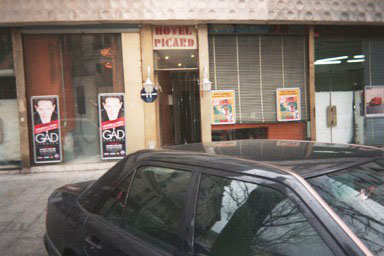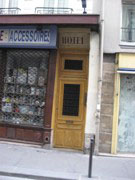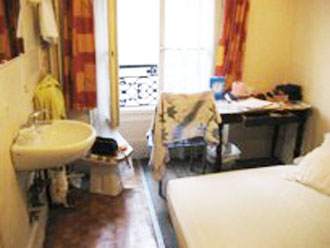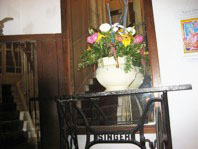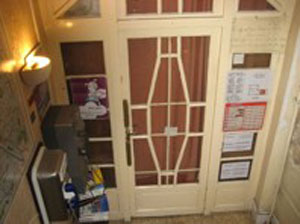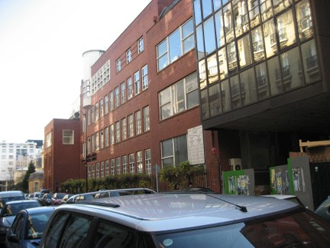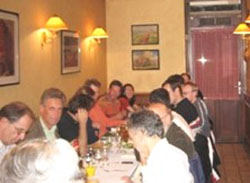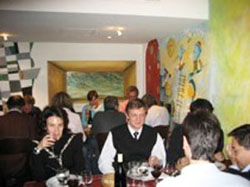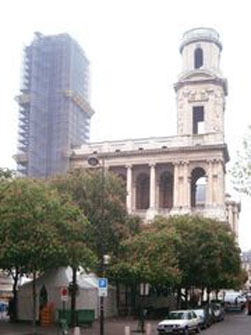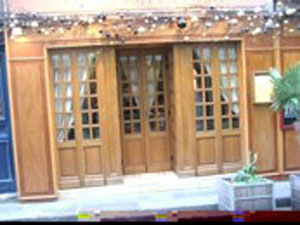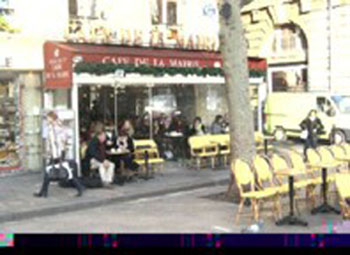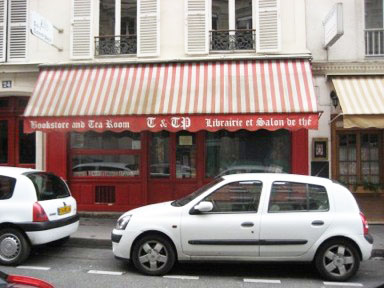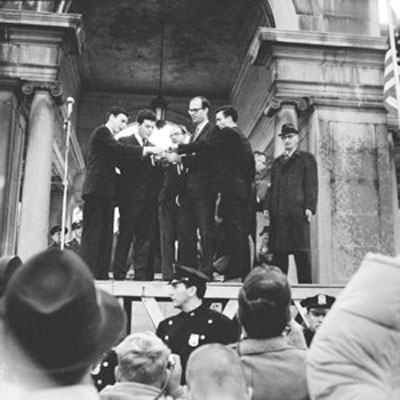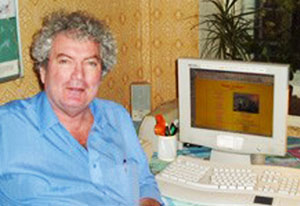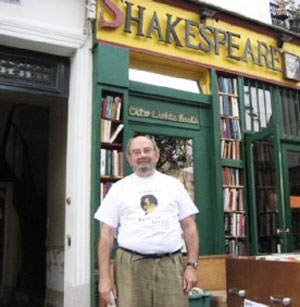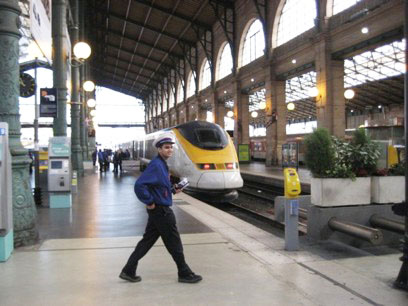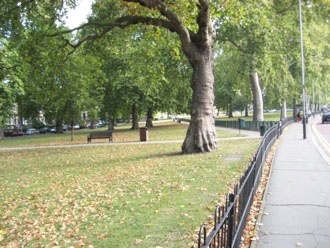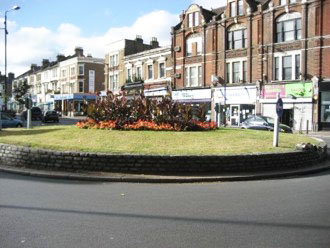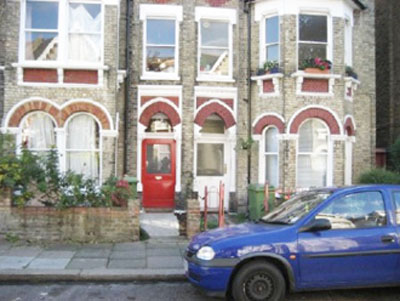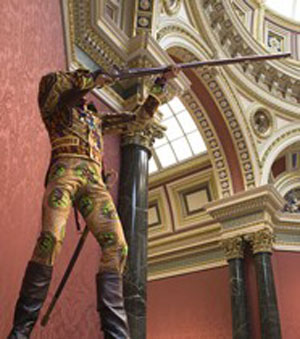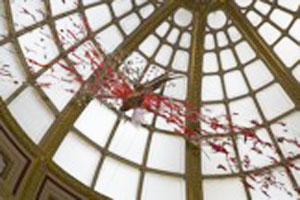Travelogue:
France and England
September 7,2007 -January 8th, 2008
Roy Lisker
Any journey worth its weight in euros needs to begin with a major crisis. This one had the effect of throwing out my calculations by a virtual displacement, that exquisite idea of Jean le Rond d'Alembert, which is based upon the notion that, by perturbing a system by some infinitesimal amount, and observing the way it comes back to equilibrium, one can deduce all of its laws of motion.
Alas! D'Alembert did not have the advantage of living in a period when Chaos Theory rages unchecked. Little did he realize that there exist, in fact, virtual displacements of the orbit of Earth (or any other planet or moon) which can send it spinning out of the solar system, or quantum systems in which one can consider oneself lucky to be merely dealing with blind chance rather than entanglements, spooky action at a distance, or crazy statistics. D'Alembert's Principle only applies to conservative systems, and the orbits of the Roy Lisker system have rarely been conservative.
September 6: The first crisis
Less than half an hour before my intended departure I received an E-mail distress message sent by Jacob Smullyan in Montclair, New Jersey (my customary host for trips abroad) informing me that his apartment , and every single member of his family was microbe infested. The same was bound to happen to me if I set foot in their house.That I couldn't spend the weekend with them was sad enough. What was worse was that my refrigerator had been emptied out, all the appliances in the room deplugged, the laundry done, farewells exchanged , arrangements with the post office made , and a host of other things handled, which now required emergency solutions to get through the next 3 days.
September 8 : The second crisis
Prior to my taking the bus to JFK Airport a large fruit, granola and yogurt sundae was purchased from a restaurant near Grand Central Station. It was put into my shoulder bag, but showed up when passed through the inspection machine. With real sadness in his voice one of the inspectors, a plump youth in his twenties sent me back into the lobby to eat it. Eyes glistening and mouth watering he regarded me with genuine sympathy.
Walking back through the inspection area into the lobby created a spectacle both unforgettable and absurd. Carried in both upraised hands were my shoes, and a number of extremely important documents, the loss of any one of which would spell disaster: passport, wallet, boarding passes and ticket. Topping it all off, like the crest of a tree above the rain forest canopy, was the big yogurt itself: slices of quinces, strawberries, apples, grapes, pineapples, floating atop a snow-white mound garnished with raisins and nuts. Heroically I sat down at the nearest bench and did my duty before throwing most of it away and returning to the line.
Traveling through 3 countries (the US, England and France) gave me an opportunity to browse through their 'mass media' magazines and newspapers. Following the beat of the Tin Drum one after another vomiticated an astonishing revelation! : The war in Iraq was a "failed (?)war (??)". We've becomes immersed in a "web(?) of lies(??)", had traveled a long "trail of broken promises"(?)! One could imagine that all the news in 3 great nations is being written by one person, telling us things that had been obvious to anyone with the least common sense 6 years ago!
September 10: Day 2 in Paris
At the Hotel Picard: A backpack and suitcase, holding all my clothes, spare glasses, papers, computer files, etc., wandered astray, courtesy of British Airways. Thus I had only my passport and wallet and the clothes on my back which I washed out every night. On this morning I visited the local outlet of Tati, and stocked up on shirts. Two days later I went out to the larger store at the Barbes Metro station for extra underwear and trousers. I could square my conscience over buying clothes at the French equivalent of Wal-mart only by arguing that British Airways forced me to do it.
September 17
The luggage finally arrived.
September 18
It has always been the case, whenever I've taken up residence in Paris for more than a few months that opportunities and outlets open up within a short time which can take years to materialize in the US, if they ever do. Following 10 days at the Hotel Picard I moved to a cheap and seedy hotel, a vestige of former prestigious days, now descending rapidly into ruin and the abyss: the Hotel de Medicis. On the rue St. Jacques, between Royer-Collard and Gay-Lussac, it's less than a block away from France's mighty storage battery of schools, laboratories and research centers on the rue Pierre et Marie Curie and the rue d'Ulm.
The Hotel des Medicis
The floor space of the barren room on the fourth floor was almost completely taken up by a large mattress. What little remained was occupied by the splintered cupboard, sink and bidet. Depositing my suitcases I walked over to the famous math-physics research institute, the Institut Henri Poincaré.
The rue Pierre et Marie Curie
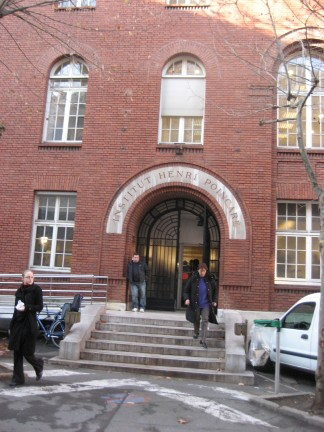
The Institute Henri Poincaré
It was purely by chance that I walked into the opening week of a 3-month conference, from September 8th to December 14th, (a trimestre): The Statistical Physics of Systems Out Of Equilibrium. One enters the tiny vestibule through one of those massive black ironwork entrances to French buildings that give one such a heightened sense of security, and much pleasure in their swinging and clanging. To the right of this stands the Amphitheatre Darboux . Christopher Jarzynski, associate professor of Theoretical Chemistry at the University of Maryland was presenting the second of his survey lectures on Thermodynamics and Statistical Mechanics. Dr. Jarzynski's highly lucid presentation was delivered at the blackboard ( a 3-panel tryptich in the manner of Matthias Grunewald). He marched systematically from left to right until reaching the far end, where he pressed some buttons, raising up the boards, while another triplet descending from on high replaced them.
A coffee break followed the 2-hour lecture. There I met one of the conference organizers, Henk van Beijeren. He suggested that I register as a participant to the conference. I naturally assumed that the cost would be at least $500. Although unrelenting anxiety about money is one of the constants of Parisian life (whether for natives, foreigners or tourists) the amount was not, in itself, excessive . Henk advised me to go to the 2nd Floor, where the secretaries (Sylvie, Claude and Nidta) have their offices.
Claude Lucet was away at lunch and I was told to return in an hour or so. Back before 2 PM, I found her sitting at her desk, alert and "ready to help", an attitude that never-wavered. Gentle, unbureaucratic yet firm. Hair? Brown? Red? Dark in any case. Quizzical look (whatever that means). Charming? Mignon? All that. As so much of her time is spent speaking English to foreign scholars, her great satisfaction at being able to converse with me in an approximation to normal French, was as unbounded as the gravitational potential of a point mass .
Registration was free! Why not put myself down for the entire period (September 10- December 14)? Okay.
Name? .....
Address?.....
Affiliation: Ferment Magazine !
That's fine: she typed the information directly into the On-Line form without a murmur. In a voice bubbling over with friendly nonchalance Claude informed that I would be staying in office number 315. I could go up there right away, although I wouldn't be able to use the computer until the following week. In the meantime there were about a dozen computers available in a computer center at a nearby location. Without losing so much as a heart- beat I replied that I would somehow manage to cope with this inconvenience. She apologized that it might also take a few days to install the telephone.
Were there any other problems I needed to discuss with her!!
Well, yes, I needed to find an apartment; the hotels I'd been staying in were too expensive, hardly suitable accommodations for a distinguished visiting scholar.
"Okay", Claude replied, "after you've been to visit Nidta, who will give you your keys, library pass, and photocopy card, either she or I will take you upstairs to see the secretary in charge of housing, Madame Rachi." Nidta (an abbreviation for a complicated Indonesian name), was sitting in the adjacent office to the right. Nidta and I took to one another right away. In fact all of the secretaries at the IHP found me sympa , as one says in French: Claude, Sylvie, Nidta, and Rachi. Had it been otherwise I could never have been accepted as a fellow at the IHP for 4 months without a single scrap of any academic credential. As far as the "authentic" scholars were concerned , once they discovered that I had the background to understand the material, and ability and willingness to be a full participant in the conference, it made little difference to them that I knew hardly anything at all about Statistical Mechanics, apart from what any educated person in the 21st century ought to know... along with transfinite arithmetic, quantum field theory, Lie groups, 12-tone music, symplectic geometry, music and medicine in Vienna in the late 18th century, super-finitism, the civil rights movement in the Soviet Union in the 60's, Elizabethan revenge tragedies, the interior monologue in James Joyce, Virginia Woolf, and Henry James, a minimum of at least 6 Preludes and Fugues from the Well Tempered Clavier, arguments pro and con for the Alvarez Hypothesis of the great dinosaur extinctions ....
I sincerely believe that these 4 months at the Institut Poincaré constitute the very first time in my 70 years of existence in this particular mind/body complex , that I have felt completely integrated with the scientific community. This was never the case, either at the University of Pennsylvania in the 50's, when I was vaunted as a prodigy, nor UC Berkeley in the 80's, when I was treated as a pariah who only hung out in math departments because he admired the accumulated brain power.
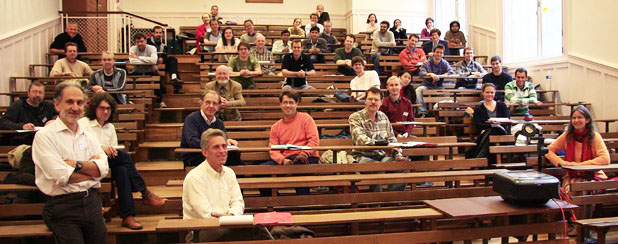 Conference Participants
Conference Participants
Statistical Physics of Systems Far from Equilibrium
IHP, September 10 -December 14, 2007. Henk van Beijeren is seated to the left, on the closest bench
Nidta gave me several forms to fill out. She handed me a sheet with the code to the computer center, the kitchens, and the front door, in case I wanted to enter the building late at night. She also gave me a library card, and a magnetized plastic card to be used at the inner door at the entrance, and a library card.
The total charges amounted 40 euros of insurance, to be returned at the end of the term. Coffee, tea and cookies were served every afternoon at 4 on the second floor lounge, just outside her office.
The formalities with Nidta finished , I returned to Claude's office. She walked with me up to the next floor and the office of Madame Rachi, the Senegalese in charge of housing. Together the 3 of us poured over the information and photos in her loose-leaf binders until we discovered a suitable studio apartment at 13 rue des Fosses Saint Marcel, walking distance from the Institute and only a few blocks away from the rue Mouffetard, the Gare d'Austerlitz, and Metros Gobelins, Austerlitz, Saint-Marcel, Censier-Daubenton, Jussieu and Place Monge. The rent was 750 euros ($1000) per month which, for Paris, is considered something of a bargain.
Two conference dinners. The delegates pictured are from Italy, Russia, China, Singapore, Belgium, Iran, Holland, Australia, Italy and elsewhere.
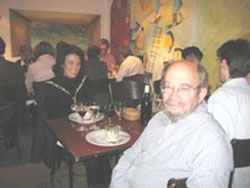
An American delegate
September 19th:
Following the two hour lecture by Christopher Jarzynski on the 3 fluctuation theorems for systems far from equilibrium, I went into the city to inaugurate one of my principal objectives for this visit to France: to uncover the literary hang-outs, cafés, restaurants and bookstores that cater to writers, French and foreign. I had 4 hours in which to do this if I wanted to be back at the Institute by 4 PM to participate in the afternoon tea.
The St. Sulpice church
A natural starting point was the area around the massive St. Sulpice church, a monumental stone emplacement neither Romanesque or Gothic , putting one rather in mind of a factory with smokestacks. It's been under restoration for as long as I can remember. During the Revolution it was turned into a museum, but was reinstated in its churchy functions by Napoleon B., thereby dashing all hopes for the separation of church and state in France until the early 20th century. When I last visited this district in the 1980's most of the 'intellectual' ( an intellectual is a person whose eyes carry the message "I know" when someone mentions the title of a book, any book ) publishers could be found in this district: Editions de Seuil, Christian Bourgeois, Editions de Minuit, DeNoel, etc. I don't know what the situation is today. In 1988, in search of the "Pouvoir Intellectuel" promoted by the Mitterand crowd, I did hang out for a while in a local bar, the mock- British " Twickenham " pub. It worked: I met an editor, Françoise Verny, who arranged an interview for me with intellectual-a-go-go, Bernhard Henri-Levy, (BHL). The story of my encounter with Mme Verny was expounded in the Ferment issue of June 5th, 1988 . So little of substance was said at the BHL interview that I never got around to writing it up.
Well, 20 years is a long time, particularly in Paris, citadel of fickle fashions. It appears that the focus of the neighborhood has shifted to food, fashion and glamour: perfume shops, clothing stores, jewelry stores, chic restos and the like. Restaurants are ubiquitous in Paris of course. It is a curious paradox of Parisian life that, although food is expensive, the thousands of restaurants one finds here are generally filled during normal dining hours. There is a empty period between 2 and 7, when it is customary for them to remain open until midnight or beyond.
The Restaurant Monteverdi
The Restaurant Monteverdi had been recommended to me as a chic endroit for encountering writers and journalists. Observing that lunch prices rose from a base of 60 euros ($90) I concluded that they weren't my kind of writer or journalist.
Café de la Mairie
I paused before a café/restaurant in the square directly opposite the church: Le Café de la Mairie A sign in one of its windows advertised a literary round-table discussion. Closer inspection revealed that it had been held last July! The cafe was crowded. Although signs promoting wines and other drinks covered the walls, I couldn't find the menu. Noticing me, a waiter whipped out a menu from his back pocket while urging me upstairs.
The tables in the approximately square room on the second floor were all arranged against the walls and facing inwards. Customers were thus obliged to look at each other all through the meal. A young woman seated to the left of the entrance kept her eyes lowered into the pages of a newspaper, a pathological rejection of eye contact. To her left sat a middle-aged gentleman with a respectable air , writing a fastidious script into a journal. On the other side of the entrance door, to my right, talking to a friend sat an elderly, melancholy woman who may have been a TV or movie actress.
Staring straight ahead I noticed a table beside the windows opening out onto the square. Seated, a woman was there. Perhaps in her 50's(?) , moderate height, horn-rimmed glasses and a yellowed skin folded like parchment or leaves of pastry, no doubt acquired from many years of sitting at a desk pouring over books and manuscripts.
An Editor ! I thought, as I walked across the room to claim the table next to hers. Since she was facing the windows I chose to face the interior. In a few minutes she was joined by a fashionably dressed young woman. About which a short comment:
The truth about French fashions is that most of the clothes one sees in the streets are of poor quality, rather " tacky" in fact. To dress otherwise one accepts having to spend a huge amount on high fashion. It is this that gives others the impression that the French are fashion conscious. They are not. There appears to be no middle ground. In the US people tend to wear ordinary clothing of good quality at reasonable prices, and there is no reason to invest in costly garments. Parisians also over-indulge an obsession for blackness: clothes, hats, luggage, gloves, scarves. It gets very depressing. One can walk down a crowded subway platform and see fewer scraps of color than there are streetlights on a street at night.
The cost of the meal was within the bounds of tolerance: 8 euros for a Tartine Catalanienne , a kind of toasted ham and cheese sandwich allegedly based on a recipe from Catalonia. 4 euros for a glass of wine. Excellent, though I rarely spend $12 on a ham and cheese sandwich, however excellent. The waiter tried to get me to order half a litre , or even a full litre of wine. I wasn't going to be taken in. The women noticed the waiter's chagrin and laughed. I commented to them: "in English one might say that he thinks I was born yesterday. Have you heard that expression?"
"Oh yes", the elderly one said, "In French one says aprés la dernière pluie !" ( After the last rain). Just before leaving I told her that I was in the neighborhood to locate the bookstores, cafes and restaurants where the writers of today congregate.
"Oh, no! ", she replied, "They're not here any more! That`s all gone !" Her friend agreed: " Nowadays they're all in groups !" What she meant was that most publishers have combined into conglomerates , which have their headquarters on the Right Bank. The women were not editors after all. We exchanged courtesies; I paid up and left.
Place Sartre-Beauvoir at St. Germain des Pres
A network of tiny streets covers the district to the south of the Place St Germain des Pres, like a gauze, or like the fine capillaries surrounding an aged eye socket. As with so many Parisian districts, this induces a kind of drunken dizziness by virtue of its charm. Thus meandering for half and hour I alighted on my goal, the rue Princesse ( named for a princess, or princesses unknown). Tortuous, narrow, shadow-cast, this street is filled with shops skewed to the tourist trade. Somewhere in the middle one finds the Village Voice Bookstore . On a sign above the door it proclaims itself a "Bookstore of Anglo-American writers." I perhaps did not start off on the right foot by asking the salesclerk why they'd slighted the writers of Canada, Australia, New Zealand, Nigeria, and India, among others.
I was just being provocative: I knew very well that it carried books by Naipaul, Soyinka, Atwood, Coetzee, and so on. In reply, he pointed to the tables at the center of the store where, in his words , I could find books written in "real English", then over to the shelves where the works of "writers of other kinds of English" were located! In response to my observation that I'd long been associated with Shakespeare and Company he said, "Oh yes, you mean the last Gulag! " Returning to the Village Voice on subsequent occasions confirmed that I'd made a good contact. The Village Voice holds many trade books, new, recent and classic, all at prices that most writers can't afford. After fifteen minutes I took my leave. From there I hobbled along another few blocks to the second-hand San Francisco Books , on rue Monsieur le Prince (husband of the Princesse?) This store specializes in paperbacks, including collector's items, such as first editions of Rex Stout novels selling for $40 .
On the afternoon of the following day , September 20, I took the Metro out to Station Duroc . A few blocks away, on the rue Mayet, one finds the oddly named "Tea and Tattered Pages", a combination of bookstore and tearoom.
Tea and Tattered Pages
No boxes of books stand before its doorway or windows. One doesn't suspect that there is such a place on this unobtrusive street until one is virtually in front of it. One steps inside to the oft-encountered dingy interior, with paint-flaking shelving for thousands of English language paperbacks. The tearoom is clearly visible through a curtain. Seated on a high stool before a laptop computer resting on a counter covered by piles of books, was a salesclerk who had to be an American. He was about my age, broad face, black hair; sad, somewhat weary self-deprecating smile, coming on with an intimidating manner calculated to put me at my ease, which it didn't . In his inquisitive eyes mockery, curiosity and roguish suspicion vied for dominance.
He also looked vaguely familiar. When I'd explained my project of visiting all the bookstores in Paris where writers hang out, he began asking me questions:
What was I doing in France?
How long did I intend to stay?
What did I do?
If I claimed to be a writer, what had I written?
If I wanted to find the French writers, why was I visiting English language bookstores?
Long pauses and a gaze of harsh intensity accompanied each question. Finally he said:
"Don't you remember me?"
A vague image from the past shifted about in my brain, fighting against the passage of many years to attach some sort of name onto this person .
"Mark?" I asked, with much trepidation,
"Yes; go on."
"Mark Edelman?"
"Yes"
Mark Edelman!!!
We'd shared places on a platform erected in Union Square, New York, on November 6th, 1965. He and I, together with Jim Wilson, Tom Cornell and David McReynolds, in the presence of a audience of hundreds of sympathizers, anti-demonstrators, police, FBI and droves of reporters, had burned our draft cards in protest against the war in VietNam.
November 6, 1965
Mark is second from left. I am in the middle
After two years of court adjournments and delays, Mark, Tom Cornell ( Catholic Peace Fellowship, Catholic Worker) and myself were sentenced to 6 months in federal prison for this - er - "felony". Since Jim Wilson was facing a heavier charge for refusing to register for the draft, this one was dropped. No charges were brought against David McReynolds, activist with the War Resisters League, and some time Socialist Party candidate for president.
Mark Edelman today
It was Mark Edelman who'd had the inspiration to bring along a cigarette lighter. It was used to re-ignite our cards after they'd been doused by the jet from a fire extinguisher in the hands of a counter-demonstrator. Mark's card was laminated! An aroma of burning plastic arose as he broke it into two pieces and threw them out into the crowd.
After his release from federal prison and a few years at Columbia University, Mark took up a strenuous and adventurous life of far-flung globe-trotting. A combined regimen of photography, poetry and English lessons has carried him through countries as diverse as Russia, Poland and Thailand. He lived in St. Petersburg for 15 years, between 1991 and 2005. He married a Russian wife, Olga. What has brought him to Paris is not certain, given that he still considers St Petersburg the finest city in the world. Of course there's the simple explanation that wanderlust of this kind is incurable. Were it not for his wife , so he maintains, he would have no reason for living. Mark has totally disassociated himself from radical politics. He claims that his involvement with the antiwar movement of the 60's was a waste of time that could have been more usefully employed. Yet, once we starting trading reminiscences of the events of that period there was an unmistakable tinge (or was it 'twinge') of nostalgia in his voice. When I returned from London in October, I had dinner with him and his wife in his apartment in Montmartre.
London, September 26- October 1, 2008
The 3 month conference at the IHP was something of a Chinese puzzle of conferences, with events known as focus' meetings' alternating with blocks of lectures by important researchers in areas such as Non-Equilibrium Statistical Mechanics, Turbulence, and Quantum Chaos. This wide scope made it possible to select in advance those subjects on which one wanted to concentrate, also to take time off during periods in which those of lesser interest were being presented. I took off the last week of September to make the first of two visits to England.
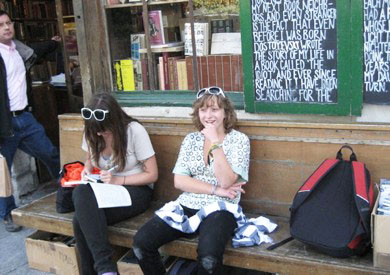
Shakespeare and Company
1. I am wearing an Aung San Kyi tee-shirt, purchased from an organization active on behalf of Burmese liberation.
2. Megan McCann is on the right
What made it possible to visit England was the invitation of Megan McCann, (age 18 and living in the 'tumbleweed community' of Shakespeare and Company) , to stay a week with her family in East Dulwich in southeast London. Arrangements were made with calls on her cellphone.
At 10 AM on the morning of September 26 I boarded a Eurostar train to London from the Gare du Nord.
The Eurostar is a private company independent of the French system or SNCF. It's costly compared to the French transit ( $180 as against $45 for the round trip), but the combination of trains and ferry of the SNCF takes a good 10 hours, while the Eurostar gets one into London in time for lunch.
The seating on the coaches of the Eurostar puts 4 people together on both sides of a small folding table. The man seated opposite me was about my age, very proper in the proper-English way , and very willing to engage in conversation. When I remarked that I would be staying in East Dulwich, to the south of London, he replied: "Oh yes, I had a girlfriend who lived there. Don't know what it looks like, only went there at nights!"
35 years ago he moved to France to save on taxes. He asserted that France did not join in on the Iraq War because Chirac was a personal friend of Sadaam Hussein. I may have shocked him a bit when I asked if he meant the Iraq war of 1916.
The disastrous 1916 Brltish campaign in Iraq
It was best that we didn't speak politics. We discovered a common subject of interest in Masterpiece Theatre productions of Charles' Dickens novels. He pointed out places I might want to visit in London that supplied the background for its adaptation of "Our Mutual Friend"
Morning, September 27:
England is a storybook land, the world of Alice in Wonderland, Harry Potter, Gormenghast. At every turn one sees examples of Medieval, Elizabethan, Georgian and Victorian city planning and architecture, together with ponderous, plastic and kitsch imitations of same. And a real Monarchy! One of the richest families in the world yet forced by law to be utterly useless. And the overly protective, overly organized, frightfully efficient social ebb and flow, creating an ambience that lingers between cozy satisfaction, frank embarrassment and a kind of terrifying chill. The United States is a land of delusions, England is a land of fables. Both are quite different from France. Is there any country in the modern world, combining the charms of France, the protections of England, and the conveniences of the US? I will move there at once, and permanently!
Megan's family lives in East Dulwich, a block or so away from the charming "Goose Green" park.
Goose Green Park and Rotary
East Dulwich
The McCann house on Oakhurst Street
The McCann family put me in mind of the family in the novel and film, "I Capture The Castle": 3 sisters, 2 brothers, mother and father. During the period of my 2 visits, there was also Fiona, a guest from Australia. They occupy a 5-story house with very little, in anything, in the way of paint, wallpaper, carpeting or floor tiles. The bedrooms are sprawled over the upper 4 floors. If one wants to take a shower one has to go down to the bathroom second floor, since there is no hot running water above that level. The father, Chick McCann, explained to me that he and his wife, Gail wanted to have a large family when they married 20 years ago, so they bought a large house. One can't accuse them of laziness or neglect, given that both of them put in 60 hour work weeks. Chick McCann, an electrical engineer, repairs broadcast transmission towers for the BBC. Gail is a Public Defender lawyer specializing in political asylum cases. Their hours tend to be irregular, so that they may be home for a good part of the day, or gone for 12 hours at a stretch. For the rest of the time, the children have the run of the house, often make their own meals from left-overs in the refrigerator and cans on the shelves. All of the house-keeping, laundry, shopping, etc., is done by Gail on Sundays. On Sunday nights she cooks up a big dinner .
Apart from Megan, currently living in Paris, the other children are Thomas, 16 , Tess , 14, Sam, 13, and Alice , 12. Alice takes care of their pet rabbit, Blue. I was warned to be careful when approaching or picking up their cat Tiger, but he appeared to take a liking to me from the beginning. Sam, Tess and Alice came down for breakfast wearing the obligatory hideous school tie and uniform. The institution of the school tie is probably the single most important factor contributing to the stagnation of British civilization. Their manufacturers, probably all in China, have a guaranteed market with 'inelastic' demand!
Early the next morning I went to Trafalgar Square.
On the 200th anniversary of the 'official' abolition of the slave trade by Wilberforce in 1807, slavery guilt is trendy in England . I attended an exhibition named Scratch the Surface on the second floor of the National Gallery. Placed around a room adjacent to the exhibition were 18th century portraits of rich beneficiaries of the slave trade: Mary Oswald; the infamous Banastre Tarleton of American Revolution fame; and Julius Angerstein, founder of Lloyds of London. The exhibition itself was in a room across the landing. Two figures had been constructed from batik fabrics by the Yoruba artist, Yinka Shonibare (OBE). One of them is of Mrs. Oswald, the other of Barnastre Tarleton. They are depicted holding and aiming muskets at helpless woodland creatures. Between them hung a struck bird, streaking blood. A document on the wall explained that batik weaving was invented in Indonesia, but didn't market well there. The textiles were shipped to Africa and traded for slaves.
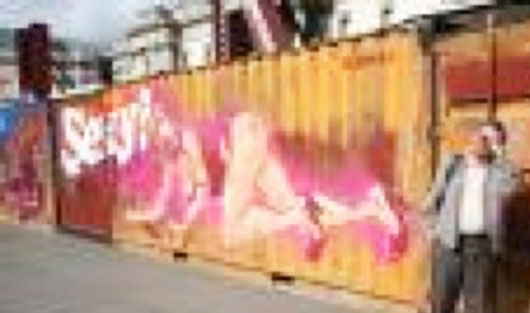
Journey Installation
I fully agree that this is a strong issue deserving of public attention. However the installation itself was painfully obvious in its message, and mediocre in its execution. The installation was housed in an assemblage of 8 tin sheds welded together like the segments of an arthropod. Adorning the outer walls were paintings of lurid sexual images . They would have looked great in a discotheque! A long line of visitors stood before an entrance door covered with black plastic streamers . Inside I was assailed by sounds of drumbeats, excited voices, cries and noises of violence and pain. The cardboard walls lining the walls of the first segment had holes cut into them. By peering through the holes one could see a reflection of one's own face superimposed on the near-naked body of a Third World slave/ prostitute.
The second unit depicted an allegedly typical prostitute's bedroom. Condoms littered the floor. The bed's mattress was soaked with urine, feces , food stains and blood. Obscene graffiti covered the walls. Another segment was lined with incriminating photos of johns caught entering brothels.
A sculpture by Amish Kapoor stood at the far end of the installation: Stigma. This was a large black sphere draped by some synthetic fabric. The tour guide asked us to stare obsessively at it until the full impact of the stigma of prostitution invaded our consciousness! The seriousness of the political theme could not make up for the banality of the conception. All very silly.
However, the day before leaving London I made a return visit to the installation. This time I had the good luck to meet up with the internationally acclaimed humanitarian, Helen Bamber herself. She was seated under a tent along the balustrade. I wanted to talk to her about my intention of setting up a "Write to Life" program similar to the one created by another one of her organizations the Medical Foundation for Victims of Torture. She is also a co-founder of Amnesty International. The "Write to Life" program helps refugees in the UK to deal with their past suffering and adjust to their new surroundings through writing workshops in prose fiction, non-fiction, and poetry. Helen Bamber gave me her card. On my return trip to England in November, I visited her and her staff at the Bamber Foundation offices on Museum Street.
Cecil Court, off Charing Cross Road
The door, courtyard and chapel of the Irish Cultural Center.
(2) ICC Chapel Free bottled drinks were placed on a table in the ante-chamber to the right of the entrance and next to the conference room: sodas, fruit juices and cans of Guinness.
Novelist Robert McLiam Wilson comes from Belfast. The ambiguities of being both a British citizen, and an Irish Catholic in a colonized nation, figure prominently in both his life and work. McLiam is an adopted middle name, the literally Gaelic translation of "William's Son", e.g. Wilson. The interviewer was an Irish Catholic priest with some role in Northern Ireland's politics.
Wilson's first novel Ripley Bogle was published when he was 22. 3 others have been published since then, including Eureka , which became the basis of a BBC TV series. He grew up in Belfast during the 70's, the time of the Troubles. Over 3,000 persons died in the violence. Wilson tends to be forgiving towards England. He pointed out that during this period the British soldiers killed 66 people, about the amount the Americans are killing in Iraq now every day.
Dodging bullets and brick-bats on the streets of the Bogside during the day, he would come home to a psychotic mother and a succession of alcoholic and abusive lovers. As the oldest brother in a large family he was the one most often obliged to intervene, thereby receiving more than his fair share of beatings. By his own account his performance in a Christian Brothers high school was miserable. The principal of the school called him into his office to give him a scolding for his low marks; then he to suggested that Wilson apply for a scholarship to Cambridge University because he could probably get one! Between high school and university he was basically homeless, surviving on the streets of Belfast with war raging about him .
He left Cambridge before taking a degree. As he tells it, he'd put off writing his thesis, a discourse on some long epic poem by Dryden, until the weekend before it had to be turned in . He spent that Saturday sitting in front of his typewriter, unable to think of anything to say . To kill time he began typing out the first chapter Ripley Bogle ! That Monday morning he walked away from Cambridge.
After awhile Wilson and his interviewer began an interminable meander around personal acquaintances and recent political developments in Belfast, and I got up and left.
The open meeting had been called to discuss ways of expanding the membership and increase public recognition. The sticking point is that the subscription cost is 100 Euros/ year ; this works out to $150. Add galloping French inflation and it actually works out to something more like $200! From the looks of it, the American Library is destined to remain an underutilized resource.
From Marcella's reading one learned that her novel takes the form of a series of puerile sexual fantasies, written in a banal style that only merits the charge of mediocrity, with an occasional feeble glimmer of vitality in otherwise vapid prose.
Many novels which purport to reveal the secret reality of Paris are of this genre: the "sexual adventurer" descends upon Paris filled with her or his omnivorous appetite for life! The genre has a long history, going back at least to the 14th century.
This leads me to make a suggestion: why not create a new literary genre, that of the "psychosis adventurer" ? The narrator travels to the big city, Paris or New York or wherever, to experience the excitement, horror and joy of the full spectrum of psychoses: paranoia, schizophrenia, hallucinations, catatonia, frenzy , suicidal depression. (Strindberg's "Inferno" comes to mind.) If he or she survives the experiment, they can writes a novel book billed as a voyage of self-discovery, spiced with contrived situations and childish cliché's.
How the "sexual adventurer" pales in comparison to the "psychosis adventurer"!
Plaza of the Jussieu campus
Jussieu Plaza (continued). The mural below reflects a commonly held opinion among students
Students Guides, Festival of Science
School of Medicine
La Hune
Librairie Nicaise
Michel-Ange advised me to go to the Centre du Livre , a government ministry on the rue Verneuil. He even drew me a map on a blank sheet of paper, with intermediate streets clearly marked: go two blocks along the Boulevard, pass a church ( either Armenian or Russian Orthodox). Beyond that is the rue St. Peres. Turn right, walking towards the river and the rue Verneuil. Turn left and walk another good half mile to just beyond the rue de Bac. The Centre du Livre reposes behind a massive door on the left.
The rue St. Peres is replete with galleries, craft shops, and stores for furniture, antiques and art objects. The neighborhood abuts upon the Academie des Beaux-Arts, Law School and School of Mines.
Being a Sunday the offices were closed. When I returned a few days later, a woman working there told me that she didn't know a thing about the Lire en Fete apart from the fact that it was being organized by her department. In about a week I could pick up a copy of "A Nous Paris" an events and entertainment newspaper distributed for free in the Metro, in which all the events in the Lire en Fete would be listed.
500 events between Friday and Sunday were listed in "A Nous Paris" : readings, lectures, conferences, theater , films, book signings, round-table discussions ..... to the greater glory of books, readers and .... would one believe it? .....authors!!.... !!! Where else in the civilized world can one find a tribute of this magnitude to my lowly profession, one that, in my native land, has a way of evoking little more than sighs, shrugs, a mixture of tolerance, pity and contempt.
The fact that most of the evening Lire En Fete events were scheduled between 7:30 PM and 9 PM , effectively reduced the number I could attend over the week-end to 3 . Combined with those in the afternoons, I put together a list of a dozen events, most of them free of charge, that would occupy me from Friday to Sunday.
The Ogre à Plumes
Armand Gatti
On Thursday afternoon, after the 4 PM tea at the IHP, I walked out to the Comedie Francaise,on the other side of the Seine near
the Palais Royale, to see if any tickets remained for a recital on Friday night in honor of surrealist poet, René Char. There did: mine was the last ticket! Being himself a comic actor, the ticket salesclerk regarded my good fortune with wry humor: only a tourist would have taken such a gamble!
On the second day of a Parisian subway strike, the unions stagger the arrivals and departures of trains ; the public cannot predict when (even if) a train may show up; the RER ( a second subway system with express service ) was shut down completely. Throughout Friday passengers swarmed through the box cars like archaea in an oil-spill. It was normal to wait for half an hour on a crowded platform, as 3 or 4 trains passed before with no place to hop aboard.
Coming, as I do, from a country where writers are despised, to one in which a banquet of writers and readers has been movable for a millennium , I was not about to let a subway strike interfere with my participation in the Lire en Fete!! At 4 PM Friday afternoon I entered the Ogre A Plumes (Feathered Ogre) on the rue J.P. Timbaud, Metro Parmentier. Armand Gatti, celebrated anarchist poet, was there to introduce his book and film , La Dernière Lettre
The Ogre A Plumes is all that one imagines for a Parisian literary café: full of character, a colorful name, on a colorful (and colorfully named) street in the artistic Marais. Inside the Ogre A Plumes one finds tables, a small bar, and shelves filled with books, many of them by the writers who frequent the cafe. The small stage, shrouded in velvet curtains, has seats for about 40 people.
Upon entering I saw Armand Gatti, a man well into his 80's, seated by a window in the company of friends. Stocky yet very strong, an open face frank and mottled, his features burnished from traveling much and doing many things. Armand Gatti's politics junkets between Anarchism and Communism. Yet in his voice there is no langue du bois : he is a genuine poet.
From Michel Seonnet, Le theatre des excluses :
"Fighter in the Maquis, deported, escaped, paratrooper, journalist, film maker, playwright, director, writer, Armand Gatti is all these things and more. He is someone who periodically sheds his identities like so much dead skin.
Armand Gatti has made his presence known on the all the front lines of the century, from Guatemala to Northern Ireland, from Algeria to Cuba... "
I bought a copy of La Derniere Lettre from Gatti's friends and asked him to sign it. We spoke a bit before I joined the crowd heading downstairs to the theatre. After we were seated he went up to the microphone and told us some stories. His writings are popular in Marxist countries, not only communist but social democracies like Sweden. At a banquet in China held in his honor Mao Tse-Tung shook his hand. Speaking through a translator he advised Gatti 'translate the ideogram!"
Gatti didn't have the least idea of what "translating the ideogram" meant! When he returned to France he consulted with a China scholar who suggested that a Chinese ideogram is composed of several meaningful elements, encased in a picture with its own meaning. Mao may therefore have been referring to the notion that the whole can be more than the sum of its parts!
La Derniere Lettre is deeply poetic. It is a tribute to a young man, Roger Rouxel, who joined the Resistance. At the age of 18 he was captured by the Germans and executed.. On the night before his execution he was allowed to write one letter. It was, as Gatti described it, "his last letter and his first love letter ". The recipient, Mathilda, survived the war and appears in the film. The monks at a monastery in the region in southern France where Roger Rouxel lived play all the parts in this film. Evocations of Rouxel's life and world are interspersed with the daily monastic routine. The poetry is spoken and chanted by the monks, the background music a modern score modeled on Gregorian chant.
Librairie Apsara The rue Daguerre
The Librairie Aspara is at 44 rue Daguerre. This is the neighborhood where I lived in the 1988's, at the time of my pilgrimage to the cottage of Grothendieck. For 3 months, between voyages to the Midi I was a resident at the Hotel Telemaque on the rue Lalande. The hotel is still there.
Perched on high stools, two college age girls were re-telling fables from Africa and Vietnam, alternating their recitations a page at a time. The language was very simple and clearly enunciated, and I was able to understand everything. In the genre of:
" And then the two brothers went away to fulfill the commands of the king, each determined to win the hand of the beautiful princess, who...."
Before I left the owner was able to pass me a cup of green tea. The worst of the transportation crisis was past; the train at Denfert carried me quickly across the river to the Place du Chatelet. At Chatelet the crowds were backed up to such an extent that passengers were being herded into blocks and moved along by Metro security guards and city police. Rather than boarding another train I walked out onto the Rue de Rivoli and walked the half mile past the Louvre and the Palais Royale, to the Salle Richelieu of the Comedie Francaise, on the Place Colette .
La Comédie Française
The recitations were of exceptional high quality, as one had every right to expect at a memorial celebration of a major French poet. Although I could have easily ( not quite so easily ; Char was a Surrealist! ) read the poetry from the page, my command of French was insufficient to put the phrases and images of spoken poetry in a coherent fashion. Isolated sentences , word combinations and an occasional image were intelligible enough to make for a profitable evening. After the poetry came readings of exchanges of letters between René Char and Albert Camus. I had no difficulty following these. There is a tradition in modern-day France of excessive, even cloying flattery in the correspondence between established writers that I find annoying. It stands in marked contrast to the nastiness of 17th century epistolary warfare between, say, Descartes, Fermat, Pascal and so on. No doubt the modern tradition is a reaction against the earlier one. I suspect that they're equally insincere.
The recital lasted an hour and a half, and was very sensibly followed by lavish applause and several curtain calls. Leaving the Salle Richelieu, I walked through the Place Colette, magical under the illumination of 19th century street lamps , with the sense of living in a world of fantasy, that the first day of the Lire en Fete, ( enhanced, not diminished by the rough and tumble of negotiating a Parisian transport strike), had been like stepping into the landscaped garden of a master artist, wherein I fully intended to linger for the remaining two days.
The Moulin a Cafe, on the Place de la Garenne in Monparnasse. Le Chat Noir. On the same street as L'Ogre a Plumes. Poetry recitations on Sundays by students from the local drama academies: Dante, Rilke, Baudelaire....
The Red Wheelbarrow
Penelope, owner and manager
The strike was not over by Saturday , though more trains had been put back into the system. I walked the three miles from the Luxembourg Gardens to the rue St. Paul. Entering the bookstore at precisely 11 AM I encountered 6 persons standing in the tiny channels of space between bins, tables and bookshelves: Penelope, four customers, and Sally Gardner, writer of children's fiction. Her current novel I, Coriander, has Cromwell and the English civil war as its background. Together with it on a small table lay copies of an earlier novel The Red Necklace, a saga of the aristocracy during the French revolution.
Penelope brought out a bottle of champagne, filled and passed around glasses to all of us. Then Sally Gardner read us two selections from The Red Necklace. She is, unashamedly , an unreconstructed monarchist, an enormous advantage in writing fiction of this kind. She did concede that the French revolution had been at the origin of a few positive ideas.
The heroine of The Red Necklace is a sheltered teen-age girl living in a castle in an isolated region at the center of France. It has been decided by her family that she will marry another aristocrat, but of course she abuses the trust of her doting parents by falling in love with a gypsy boy, the son of an itinerant charlatan in the tradition of Cagliostro. Und zo weiter ....
During her reading a foursome entered the premises, setting the door's bells jiggling: mother and father and two children. They came from South Africa, although their mother was born in the mid-West US. They were in Paris because of a rugby match between England and South Africa ( South Africa won). The husband worked in corporate finance. People like that always make me feel that I have to pretend to be middle-class and understand what they're talking about, but we somehow got into a conversation about the lack of international popularity for American football, although rugby, soccer and cricket are played all over the world. He explained to me that all one needs to play rugby is "a couple of yobs with a ball to throw around." Football requires planning and money .
His wife's background was very different. After majoring in French at Mount Holyoke College, she came to France to study French history - in French! I was impressed. She shared her conviction that potential historians must do their studies in their nations of interest. Of course "nationhood" is fluid, particularly in a world flooded with Diasporas, but I conceded her point. The extra effort was well worth it; she didn't have much respect for scholars of French history who'd done their studies in the US and in English.
Before coming over to France the family had visited England for several days. The father apparently has some connection with an aristocrat who'd been invested as Lord Muck-a-muck just days before! He put them up in his own castle! Upon learning this I introduced him to (unashamedly unreconstructed) monarchist Sally Gardner. They were soon deep in conversation. I promised Penelope that I would be
returning later in the week. The Red Wheelbarrow became one of my favorite places in Paris.
Lion and Apollo Restaurant Henry Lopes (far left)
I was only half an hour late for the reading. That was alright (Sic) : events tend to begin late in Paris. At the back of the Apollo one finds a large terrace covered by a great plastic tarpaulin canopy. The audience numbered about 50 persons. Henri Lopes, surrounded by a panel (see photo) was seated at a table far down in front .
Unknown to me at the time Henri Lopes is an international political celebrity. Apart from a common sympathy for aspects of Marxism, his career places him as far distant as one can imagine from that of an Armand Gatti. Anything remotely resembling a hankering towards anarchism is completely foreign to him. A brief resume:
1965-1966: History professor at l'Ecole Normale
Supˇrieure d'Afrique, in Brazzaville, French Congo
His novels include: Tribaliques,1971; La Nouvelle Romance,1976; Sans Tam-Tam, 1977; ; Le chercheur d'Afriques, 1990; Sur l'autre rive, 1992; Le Lys et le Flamboyant, 1997
Henri Lopes read us several excerpts from his writings.
With his strong and resonant voice he's an effective reader of his own works. A primary theme is that of "metissage", the
mixing of African and European ethnic backgrounds. As he told us, his parentage is French, Belgian, Spanish, with African parents from both French and Belgian Congo.
Of course one would expect the writings of such an individual to have political overtones yet, perhaps because his life has been so inextricably political, his writings tend to be evocative, nostalgic and lyrical.
A few days after the Lire en Fete I borrowed a copy of his novel " Dossier Classé" (2003) from the library on the rue Mouffetard. It's thinly veiled autobiography: The protagonist teaches literature at Haverford College. He takes a leave of absence to return to his homeland which he's not seen since he was an infant, to track down the truth about his biological mother and father from whom he was separated early in childhood because of political violence.
In the question period, a student from the French Congo began asking him rather hard and embarrassing questions. What a relief: no ritualistic flattery of the great author here! Lopes took it in his stride, obviously pleased that someone had read and thought so much about his writing. I left shortly afterwards. On the way out I was stopped by some unsavory uglies , 3 waiters who claimed I'd bought an orange juice and hadn't paid for it. Eventually they conceded, or, more likely, decided not to pressure me into paying for something I hadn't bought, and I was allowed to leave.
Later in the month the play "Molly: A dialogue with Beckett" was presented by the English language theatre collective "Moving Parts", in a theatre off the Quai Voltaire. In it Godot confronts the ghost of Samuel Beckett and accuses him of stealing his name, then denying him a part in Beckett's most famous play.
Bust of Samuel Beckett
Mairie of the 14th Arrondisement
The Elementary School Writing Prize Event
A scene from the play "Molly: A Dialogue with Beckett." Jazz Combo at St. Germain des Pres
I gave them something of a shock when I walked over and spoke to them. To make matters worse I indicated that I also played the violin (what laxity is permitted in such a confession!). The dismayed the other man, composer Anthony Girard, far less than it did the violinist. Girard and I examined the notice describing the Open House in A Nous Paris and discovered that it was actually scheduled for the next Sunday, October 28th!
Authors Open House, October 28th
Girard's piece, the first on the program, was entitled La Rose Inaccessible. In a mixture of diatonic and serial techniques one found a certain very familiar theme being frequently re-introduced. Towards the end I finally remembered what it was. Of which more later.
The composer of the second work, A Tribute to Philip K. Dick (the science fiction writer), was by Michel Lysight. He'd lived some years in the U.S. and Canada. The idiom was decidedly Aaron Copland, somewhere between the Passacaglia and Billy the Kid.
The third work, by Chrystal Marchand, was, for me, the most interesting among the 3 . It was the most "French" in style, a product of the Debussy/Stravinsky school, somewhat academic in its formal precision, yet filled with original inventions and innovations.
From the first notes of the Ravel opus one recognized the difference between 3 good modern composers and a great master. The Introduction and Allegro is a kind of concerto for harp and chamber orchestra. The harpist , Marion Lenart-Crambes was a true virtuoso. Indeed, all of the artists (including the violinist I'd inadvertently embarrassed) were of a high quality. Despite a certain hype being promulgated by the entrepreneurs of the music industry, Classical Music ( as opposed to the omnipresent drivel these plutocrats are forcing us to consume) is neither dying nor even sick.
The concert let out 5:30. I hurried back to the place Denfert-Rochereau. Moments before reaching the Metro Station, I realized that I'd forgotten to take any pictures!! The decision to return effectively ended the hope of attending any other Lire en Fete event that day.
Conductor Bernard Calmet
The soulful visage of Anthony Girard
He laughed : Touchez! We shook hands and I returned to Place Denfert Rochereau.
October 30:
The shelves of this medicine cabinet, placed directly above the sink, could be discretely concealed from prying eyes by sliding mirrored sheets. These could also be covered up by a cute pair of slatted wooden screens (portelettes ? ). These dangled by tiny spikes set into round sockets screwed onto the vertical edges of the cabinet. Nothing more, neither nails, nor screws, nor hinges, held them in place.
It is therefore not too shocking to relate how, washing up on this particular morning, I lifted my elbow to a standard posture for steadying the position of the appendage employed in pissing (and potentially refurbishing the human comedy). The elbow established contact with the base of the right portelette , which sent it flying into the air, thereupon to descend onto the sink with a loud crash. A hole the shape and size of a small pancake was produced , filled by chunks of plaster.
The Hole in the Sink
Then she reduced her demands, asking only that I share the costs in some way. Needless to say the plumbers, when they did eventually show up, insisted that the entire sink, bowl and column, had to be replaced. However, between the wreck of the sink and its final restoration so many other things went wrong that Marta was more than satisfied by my agreement to pay the stipulated rent for the studio apartment ( 750 euros/month) and not demand a refund!
That day I bought a roll of masking tape and patched up the hole so that I could still use the sink. After several delays, a plumber and his assistant ( the way Marta pronounces the "b" in "plumber" is still delightful in recollection! ) finally showed up a week later at 8 AM. The plumber was an intelligent man in his 40's with a keen appreciation of the subtleties of Murphy's Laws as applied to the Parisian context. His assistant, by contrast, was a somewhat dopey a youth in his 20's. He slouched about awkwardly waiting for instructions, and seemed never to have met an American, ( or any other foreigner) .
Our search for the spigot shutting off the flow of water to the bathroom was a mere preamble to greater things. The plumber directed our attention to a grate at the base of the connecting wall between the living room and the bathroom. It was positioned behind a floor to ceiling movable closet. We dragged the closet away from the wall, exposing the grate, hypothetically located behind which the spigot controlling the flow of water into the bathroom pipes was to be found. To our astonishment we discovered that the spigot was oriented in such a way as to make it impossible for normal human hands to turn it off! "Why was it installed that way?" I asked. The plumber had a simple explanation: "C'etait une bétise!" (Somebody was stupid ). The assistant crumpled to the floor in a fetal posture, digital camera in hand .
By crooking his hand inside the hole, he was able to take some photos of the exposed pipes to show to Marta . The task now fell to me to call her up. Normally the telephone that came with the apartment didn't function; I generally used the one in my office at the Poincaré Institute. Repeated dialing sometimes succeeded ( after opening up lines of communication with the police department, a travel agency, a long distance operator, and so on... ) in getting through to the desired party. By the end of October I'd stopped using the telephone altogether. On this occasion I was able, after 5 attempts, to get hold of Marta Spranzi, PhD in philosophy of science from Florence, U Chicago and the Sorbonne, author of an interesting treatise on the dual role of proof and persuasion in Galileo's "Dialogue on Two New World Systems". Applying her extensive training in analytic thinking to the situation she came to the conclusion that the plumber's description of it could not be correct because it wasn't logical. The plumber, a man with no higher education but an appreciation of situationist ethics, replied that logic had little relevance to modern-day France. The only way they could reach the pipes would be to carve a hole into the concrete side of the bathtub wide enough for a hand to reach the spigot.
This was too much for Marta to assimilate all at once; besides, she was about to board a plane to attend a conference in Chicago. In the meantime the plumbers would report back to their boss, give him the photographs, and await further instructions from him . Before leaving they removed the masking tape and filled in the hole in the sink with some rubbery plastic.
When she returned a week later Marta had accepted the fact a hole had to be drilled in the concrete encasing the bathtub.
Front door of 13 rue des Fosses St. Marcel
Keyboard for the entry code
At 10 o'clock that night I came back to my apartment to find myself locked out on the street. Fortunately someone on the second floor heard me banging on the door and came down to open it. The night before he himself had been locked out for 3 hours. To avoid being stuck on the street, I checked into a hotel, (the Medicis!) . I also bought a sleeping bag: in the worst case I could sleep in my office. Marta returned home from Chicago to face an angry and very upset tenant. She agreed to pay for the hotel until the keyboard was reactivated. The company that managed the building had their offices on the rue de Rivoli. They directed the janitor to place a sign in the entranceway to the effect that the keyboard would be fixed by the end of the week . It was also requested that, for the next 5 days, the front door be kept ajar. However, upon returning on each night thereafter I discovered the door closed. On some nights I was successful in alerting someone by banging on the door.
Others were spent in the hotel. That Friday an electrician did show up to restore the circuitry. At the same time the code was also changed. To learn the new code I had to get into the building and read a sign that had been placed over the mailboxes. Fortunately a doctor had his offices on the first floor and he let me in. I copied down the new number and naively believed that the crisis was passed.
On Saturday night I returned home around 10. Like a cemetery whose ghosts are out making their rounds, the front of the building was devoid of all signs of life. Not a single light was on in any of its apartments.
When I attempted to enter the new code into the keyboard I discovered that it had failed again, after one day. My intemperate pounding on the doors attracted the attention of the owner of a private nightclub located a few buildings away down the street. He thought at first that I simply didn't know the new code; he, for some reason, did. Trying it himself confirmed my diagnosis. Then he told me to wait and disappeared into his club. By coming into my building through a back alleyway he was able and let me in.
For Sunday night I once more checked into a hotel. On Monday morning I called Marta from my office at the Poincaré Institute. She agreed to cover the cost of staying in hotels. There was no more talk of my having to pay for the new sink. Another wrinkle emerged: some of the building's tenants had keys to the front door , others didn't! I asked Marta if she owned a key to the front door. She wasn't sure, but promised to look around. All of this appeared very strange to me : if she'd given me a key when I first moved in, all of these problems could have been avoided. That afternoon she called me back at the IHP. She'd discovered a copy of the key. Her husband, Dan Angler , would bring it to me at 8:45 the next morning. Dan arrived on time, riding on a Ve'Lib bicycle. (This is an ambitious project of Sarkozy's to ingratiate himself with the environmentalists by setting up stations for free bicycles around Paris.) Dan was yet another mathematician. When I mentioned that I'd taken a few courses in theoretical physics at the Poincaré Institute in the 70's, he commented that he'd also taken a course there in the same period. I then observed that it was therefore fortunate that I hadn't made that story up! . We both laughed.
Dan's accent and manner were decidedly "New York": middle-aged, pallored , with a penchant for dressing in dark black ( something of a Parisian obsession that I found troubling), honest and plain-speaking with a wry sense of humor. He descended from the bicycle and stationed it against a wall. Then he dispocketed the key, a most peculiar object putting one in mind of a mangled hair curler, and went to the door. It was immediately obvious that the shape of this key, which had belonged to Marta's mother, had nothing to do with the shape of the keyhole. The lock had been upgraded years ago.
Dan was thoroughly exasperated - abasourdi as they say in French. He couldn't hang around; he was on his way to catch a plane for a conference in Finland! The best he could offer was to break the lock; he asked for my help in ripping the bolt-case off the door.
The bolt-case, after restoration
Our stratagem failed; clever ideas usually do. We'd neglected to check take into account the long bolt on the left panel descending into a hole in the concrete floor. Once again the doctor let me in. Using my telephone at the Institute I was able to catch Marta the next morning, just as she was rushing off to Italy. She advised me to check into a hotel again. I also let her know that the plumbers had not yet returned.
In the meantime a solution was found that enabled those of us who didn't have keys to get into the building. A person or persons unknown simply hammered a screw deep into the lock so that it couldn't move! Then another sign appeared in the entranceway. It explained that some people didn't have keys; that was why the doors had to be kept open until the keyboard was repaired, sometime later in the week.
On the lower edge of the cardboard sign someone had scribbled another message: "Why aren't people getting keys for themselves?" The answer emerged in due course. That Wednesday morning I spoke to Raki, the housing secretary at the IHP. She promised to call Marta, who was still in Italy but could be contacted by cell phone. Raki knocked on the door of my office early that afternoon. Marta was on the phone and wanted to talk to me.
She was thoroughly distraught ; apparently the seriousness of the situation had only now begun to sink in. The account I'd given to Raki of all the things that were going wrong: the accident with the mirror, which wasn't my fault; having to go for weeks with a broken sink; now the problems with the door, were not the most encouraging kinds of references to give to the IHP housing office, if Marta ever intended to rent the apartment to the close knit science community in the future.
Marta became very emotional in the Italian manner- culminating in a dramatic role-reversal in which I ended up being the one having to comfort her because of all the troubles she was having with the damn apartment!! She repeated her standing commitment to cover hotel costs, and promised to go across the river and pick up a key for me the moment she returned. I suspect that she didn't realize how much money it might cost her to continue paying out for hotels. If, for example, I were to return to the apartment at midnight and find the door bolted and all the lights out in the front apartments, I wouldn't check into the cheap places I'd been using at 30 euros a night, but into the one closest to me up on the Boulevard St. Marcel, where the cheapest rooms (if available) begin at 100 euros ! No to take into account meals, transportation, etc....
Yet, when Marta returned and went across the river to the building managers they were unable to give her a key. New ones had been ordered and were expected to arrive in two weeks!!
An electrician showed up a few days later and rewired the circuitry on the keyboard at the entrance. On the next day the plumbers returned and replaced the sink. It took them less than an hour to drill a hole through the bathtub, turn off the water and replace the sink. They also charged Marta another 100 euros for a new spigot.
The trek from the Boulevard St. Marcel to the Gare du Nord, an estimated two and a half hours, would have to be done on foot. Lugging a backpack and shoulderbag I left my apartment at 7:30 AM. Long promenades through Paris, whether they be voluntary or imposed by circumstances, are always exciting. On the rue des Ecoles I stopped at a boulangerie to buy two pastries, a Pain Raisin and Croissant aux Amandes. (the inspiration, perhaps, for Shelley's Ozymandius ?) Then down to the Place St Michel via the rue Monge, across the Seine and onto the Blvd Sebastopol.
Here I went into low gear for the long walk northwards to the Boulevard Magenta. A second rest break was made at a stupendously charming café, the Madame Tomate on the rue aux Ours (street of the bears), presided over by an incalculably charming coffee counter waitress .
The English immigration formalities for a trip by Eurostar are executed in Paris. My passage through this tedious business was greatly facilitated by being able to tell the immigration officer that I was a physicist working at a research institute in Paris. Over his congenital scowl there passed, like a raven's shadow, a look of awe. He stamped my passport and waved me through. For additional protection I was carrying a letter from the Poincaré Institute, signed by its director . Had this official been told that I was "really a writer" , with novels, translations and magazine articles published in England and France, I might have been taken into a side room, interrogated and strip-searched!
Just 15 minutes before the train pulled into St. Pancras station, I made a decision to descend to Chichester on the southwest coast. I needed to be in London on the following week: an appointment with the Helen Bamber Foundation had been set up, and the family in East Dulwich was expecting me again. The area was not unfamiliar to me, having spent the summer of 1988 in Arundel, which is a short quantum leap from Chichester, doing translations for the publisher Ellis Horwood, Ltd.( It has since been bought out by van Nostrand.) To my knowledge I didn't know a soul in modern-day Chichester.
Chichester
The B&B was in Nutbourne, 6 miles out of the city, and I had to take a bus. At 6 PM the driver let me off at the old Post Office. Here there is a sign indicating the way towards the Kia-Ora Nursery, where the B&B is located. I found myself walking down dirt roads and stepping in mud. Only the weak radiance of a hand-held flashlight illuminated my dolorous surroundings. I ventured to knock on someone's door only after running up again a number of rear-ends in bags (culs de sac ) . A frightened elderly couple (This part of Sussex is known as the 'geriatric coast', England's closest approximation to Florida) told me to go back onto the street and return by an alleyway going off to the left. After some more sloshing through rain and mud a cluster of home lights appeared off to the left. I'd arrived.
The owner's name is Ruth Pitts. She manages the Bed and Breakfast with her husband, a locomotive engineer forced into retirement by arthritis. The Kia-Ora nursery is no longer functioning. What remains of it is a few rows of disaffected greenhouses to the left of their house. In their advertising for these accommodations this couple could justifiably append the adjective 'luxurious'. It is doubtful that one can find as much for even 50 pounds a night elsewhere: double bed, television, refrigerator, desk, Internet. Private bathroom with shower, and an assortment of manufactured greases for ridding flesh of its obnoxious by-products. In the bedroom one finds a floor to ceiling sliding glass door for entering directly into a garden. When I was there it was 6 inches deep in rain, but no matter .
Last and hardly least: a classic English breakfast, none of the "expresso + croissant" tradition of the country I'd left only the day before! One rich enough to carry me all the way to dinner: eggs, bacon, toast, cereal, juice, yogurt, coffee. I received this feast from Ruth's hands in a dining- room filled with fascinating antiques: a vintage upright piano from an earlier century; early 20th century photographs, mounted and framed; paintings; flowers; crafted furniture; alcoves and niches with family portraits, bibelots, momentos. In a glass case directly behind me at the table stood a scale model of a British Rail locomotive. It had been constructed by Ruth's husband, two yards long and more than a foot high.
Nor did her hospitality stop there: hearing that I wanted to spend part of the day in Southampton, Ruth downloaded train schedules for me from the Internet. After breakfast she drove me to Havant , a town 6 miles away, where the connection is more direct than the one from Chichester. On my two nights in Nutbourne I took dinner at an Indian restaurant a short distance down the road. Afterwards I watched the news on the room's television set, thereby picking up the latest details of the "teddy bear" incident in the Sudan, and the bizarre disappearance, through governmental incompetence (ah! that school tie again!) , of two encrypted CD's containing vital statistics on 20 million families.
Contact Information: I'd drawn up a list of questions to ask Dr. Monk. The absence of any effort on my part to investigate the possibility of his not being on the campus was a matter of choice: a negative response would have eliminated my sole reason for going to Southampton! By leaving the Southampton train station at 10:30 AM that morning I became acquainted with a dirty, desolate, deserted, - those dreadful 'd-adjectives' : drear, dismal, despondent, dissolute, decaying, deteriorating, dingy and shabby backwater. Okay: it isn't that bad, it's not Poughkeepsie!( To be completely fair, my opinion of Poughkeepsie is based in large part on an unforgettable two weeks as a resident of the Dutchess County jail.
Bard College does give an excellent education for those select few who know how to go about it.)
My peregrinations were brought to an end by the rancid odor from a Kentucky Fried Chicken franchise at 3 blocks distance. I then returned to the train station to board a bus out to the University. Southampton's neighborhoods become decidedly more habitable away from the downtown. Half an hour later the bus dropped me off at the university in media res.
Highfield Campus
The Avenue campus is a pleasant enough venue, although Philosophy, along with Archeology and other dusty disciplines, is in one of those concrete and plastic adjuncts thrown up to accommodate the overflow. Unbeknownst to myself I'd come on "Parent's Day"! The security guard, a burly Nigerian, naturally assumed I was a parent, (just as I naturally assume he was a Nigerian). No, I just wanted to visit Ray Monk in Philosophy. Being someone unlikely to take much interest in Russell or Wittgenstein ( one never knows), he hadn't heard of Dr. Monk. Regarding me with a certain low-level perhaps justifiable suspicion, he asked me to follow him back to the security desk. There he looked up and dialed Dr. Monk's office phone. As the chances of Ray Monk being in his office on any particular day (Parent's Day in particular) must be about the chances of anyone ever reading the 3rd volume of Russell and Whitehead's Principia Mathematica , it wasn't surprising that no-one answered. The guard sent me to receptionist in a cubby-hole in another part of the building. She hadn't heard of Ray Monk either, but took down a message and promised to deliver it to him . Returning to the corridor I spoke to a faculty member who was quite aware that Ray Monk was Southampton U.'s most famous employee. She walked with me past the security guard, thereby avoiding rekindled suspicion, and deposited me at the Philosophy annex.
Alas, Ray Monk was in Norway! I was not at all disappointed. The adventure of walking around looking for him had provided adequate entertainment for one afternoon: the delight of being confused with a parent; the perplexity of the security guard; the confusion of the receptionist, the scorn of the philosophy department secretary; the hurly-burly of parents and children strolling the corridors singly or in packs; the walk through tamed wilderness between the Highland and Avenue campuses , the opportunity to rethink my views on Bertrand Russell, Ray Monk, education in England and America, the profession of philosophy ...
Lichenous log in the tamed wilderness
It really exists, after all!
Across the street
River Exe and quays .
The Medieval Bridge
University of Exeter. Seen from a distance of a mile, one knows that it has to be the Physics Building!
St. Luke's campus
On my first night in Exeter I attended a performance in the University's Northcote auditorium by the phenomenal Bournemouth Symphony, with music by not terribly phenomenal composer Gerald Finzi and the pleasant Ralph Vaughan Williams. In returning to the Backpacker's Hostel at 11 PM I became thoroughly lost. Retracing my path back to the downtown I passed, with some anxiety, through several Exeter neighborhoods I would never otherwise thought of visiting. Although these neighborhoods were perfectly safe I've been conditioned by growing up in America.
The New Theatre Around the corner from the Backpacker's Hostel 17 Molton Street, one of Blake's residences
The exhibition on the upper floors.
This held drawings, etchings, etc., by 50 artists based on themes in William Blake's poetry and graphics. Reproductions of these have been compiled into an artist's book that can be purchased from the Blake Society "Frozen Music", an ice installation above William Blake's grave in Bunhill Fields, near the Old Street Tube Station. A sculpted block of ice was placed on the grave at 12 noon, November 28th, to remain "until meltdown".
A page of the sculptor's poetry, inside the ice.
Afternoon lecture in the Blake room of the Tate Gallery
Open mike at the Tate, following the lecture
The Poetry Place coffee shop, near Covent Garden.
Café area of Poetry Place.
Royal Academy of Dramatic Arts
A coalition of groups, including the Amis de Don Quichotte, the Red Cross, Secours Catholique and the Abbé Pierre, promised to return to the quais. At the center of the dispute is the city's promise that there would be 27,000 beds available in homeless shelters by this winter. As of December there were only 14,000.
Conference in Celestial Mechanics
Observatoire de Paris
Roof of the Observatory
18th century telescope
19th century telescope. Still in use
The "Spider" The winding staircase, an architectural marvel. There is no supporting column
Transit of Venus, French style Shakespeare and Company IRCAM composers and personnel Kangaroo Songline, basement theater of Carr's pub
This is a cast picture taken after the production. Left to right: Dingo Dog, German Hermit, Sylvester the Bandicoot, Punamalli the singing teacher, Mustapha Ali the camel (at back), wallaby and wombat (front), Esther the Bandicoot, Author, Kokamunga the koala bear (front), Scale-Tail the Crocodile, Buffalo Landlord, Easter the bandicoot mother, Awk- Walk the duck-billed platypus. Missing are Cobber Bob, prospector, Bunga-Bunga the flying squirrel, and director Stephanie Campion
Trafalgar Square
From the National Gallery I walked down a staircase into the promenade above the Wellington Monument in Trafalgar Square. Located there was Journey, a "sex slavery" installation sponsored by the Helen Bamber Foundation, designed by Emma Thompson ( aka Duchess(e) d'Antan ) with art by Amish Kapoor. After visiting the installation I spoke with the organizers and staff members of the Foundation. The installation was built around the narrative of Elena, a woman who'd been smuggled from Moldava into the UK. Gail McCann had worked on her case. Her handlers used an alleged 'debt' of 20,000 pounds to force her into prostitution.
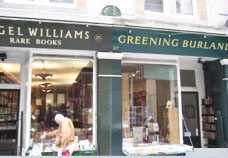
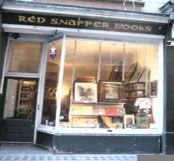
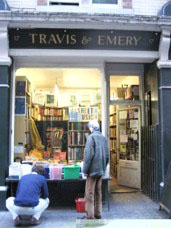
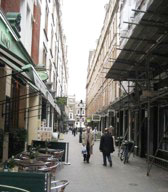
The connection between Charing Cross Road and Charing Cross Station is not immediately obvious to a newcomer , and I had to ask around to find it. As I'd been told to expect, the side streets are crammed with bookstores: antiquarian, numismatic, musical, artistic, theatrical, rare books, etc.
October 1 , Paris:
Jennifer Dick, writer of poetry, sends out a monthly bulletin of English-language literary events in Paris. For me, the "Jen list" was as important as a guide to my voyage of discovery of cultural Paris, as the IHP would be for my understanding of Statistical Mechanics. The Anglophone literary world in Paris is enormous, comparable in importance if not in size, to those of San Francisco, London and New York. Throughout the month of October, 3 to 5 of my evenings per week were taken up with running around Paris, soaking up book-signings, poetry readings, theatre, lectures, discussions, both in English and French! It kept me off the streets and away from the television set.
Evening, Thursday, October 4th.
A reading by Robert McLiam Wilson, author of "Ripley Bogle"
Irish Cultural Center
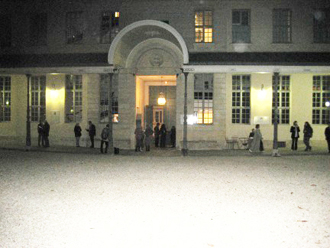
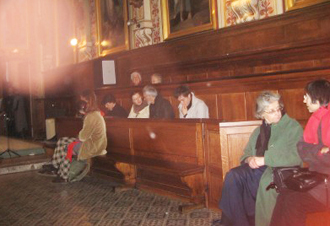
The Irish Cultural Center is located less than a block away from the Institut Poincaré, on the appropriately named rue des Irlandais . France and Ireland have maintained friendly relations ever since the 16th century, when Henrican Catholics started sending Roman Catholics into exile. Its extensive cultural program receives support both from the Irish and French governments. The ICC is not immediately recognizable on this tiny street, which also holds administrative buildings of the Sorbonne. Massive doors open into a large courtyard holding lawns, paths and tables, a delightful park for picnics and encounters.
Wednesday, October 3. 7:30 PM :
Open meeting at the American Library in Paris
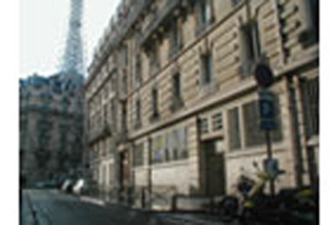
The American Library in Paris is located near the Metro station Quai de l'Alma and the Eiffel Tower, on the tiny rue de General Camou. It was set up around in the 1920's: the thousands of books received during World War I by soldiers from the United States, England and the British Empire formed the core of the library's collection. Most tourists and even residents don't know that there is an American Library in Paris, although it has about 2000 subscribers. The library has its place in history. During the 20's when so many paradigm writers were living and working in Paris, the membership list of the library included the names of Ernest Hemingway, Gertrude Stein, Hart Crane, F. Scott Fitzgerald, and others. It managed to stay open all through the German occupation and, at least before the US entered WWII, was able to pass books along to Jews denied access to other libraries.
Shakespeare and Company
Monday, October 8th
The Shakespeare and Company building is quite old. The second floor reading rooms conjure up scenes from Dickens: the Old Curiosity Shop or Little Dorrit. The room looks directly onto Notre-Dame cathedral. Several times daily, one hears the sounds of carillons of bells coming from Notre-Dame, filling all the neighboring streets. Readings are held here each Monday night; I gave one myself, of "Sam, the Messiah Man" on Christmas Eve. On the evening of October 8th I arrived a few minutes late. Most of the chairs in the small front room were taken; I managed to find one at the back. The authoress was Ann Marcella, reading from her recently published novel Remedy. Marcella has lived in Paris for 2 decades. She claimed to be able to relate to every stratum and ethnic group in Paris, in contrast to most authors of novels about Paris. She asserted that they simply don't live here long enough to develop her depth of understanding and background. After a brief introduction, she read passages from Remedy. 'Remedy' is the name of the principal character, a devout Irish Catholic pursuing self-discovery in Paris.
Festival of Science
Paris, October 12th and 13th
The Fete de la Science , scheduled for the weekend of October 12th 2008, was spread over 6 institutions within in the thousand year University City, the Latin Quarter or 5th Arrondisement. The largest number of events took place on the science campus of Jussieu.
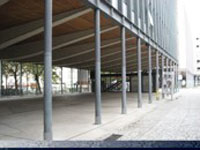
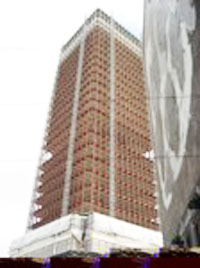
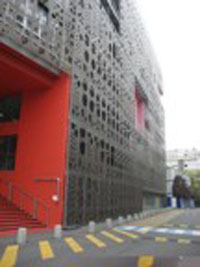
For a nation which has , for the past 300 years, maintained a leading role in the evolution of modern science, the shambles of the Jussieu campus is a total disgrace. Not surprisingly, the sabotage must be laid at the door of politics: Socialist, Communist, Capitalist, each with its competing notion of the purpose, and even the nature of science. One might more simply characterize it as Le Corbusier's penultimate nervous breakdown.
Perhaps the Jussieu campus could find a proper home the planet Trantor, Isaac Asimov's capital city for his Foundation Empire, every square inch taken up by buildings housing the bureaucratic administrations of all the planets in the galaxy... even then, not Trantor in its hey-day, mind you ... a Trantor already invaded, plundered and sacked by the aliens. Depending upon which part of the campus one wanders onto, it can be in a condition of arrested development, or one of arrested demolition.
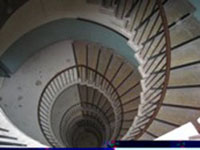
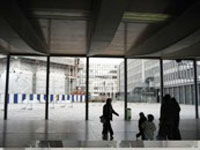
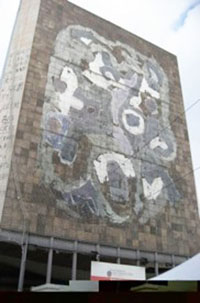
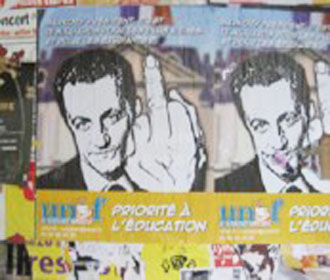
The surface is pocked by scores of squat rooks, towers 6 or more stories high. Dominating by functionalism, the wide winding staircases used for climbing through a dark grey metal cylinder to reach them, renders the classrooms, offices and auditoriums mere pitiful adjuncts. As for the elevators, one does not have to suffer from claustrophobia to choose to avoid them.
Absurdity reigns supreme. Indeed, it was the destiny of Jussieu that it should come into its own only when it had been reduced to a bombed-out shell, a metaphorical Dresden. In the midst of this nihilist setting, scientific activities, classes, research, even conferences, pursues their monodromic fermentation (daily round) .
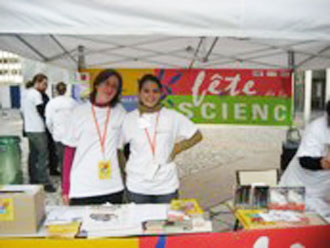
Gates of the Jussieu Campus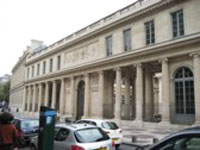
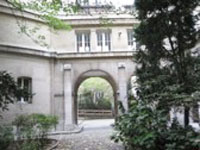
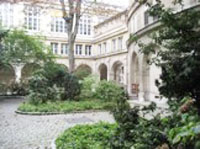
The medical school at the Université René Descartes is on in the appropriately name rue de l'Ecole de Medicine . Two graduate students in biology were seated at a table in a cloister corridor, supplementing the information on posters on the stone walls portraying the "History of Immunology". I immediately recognized that the account on these posters of the evolution of vaccination was woefully inadequate.
I told this to the students. Rapt in attention, they took notes while I delivered a spontaneous lecture on variolation, inoculation and vaccination, from the travel diaries of Lady Wartley Montagu, the opposition of Ingenhouze (The "Great Inoculator"), to the reservations of evolutionist Alfred Wallace. They asked for them references to books and articles, which I sent them a few days later . Before leaving they treated me to a glass of Sangria.
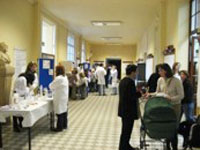
There are chemistry labs adjacent to the Institut Poincaré on the Curie Campus . In the lobby on the ground floor I walked among children and parents watching students perform "experiments" with food, detergents and other common household substances. Is it possible that Lavoisier became the greatest chemist in history through observations made on French cuisine? !
Lire en Fete , Paris
October 19th 2007
Scanning the Internet before leaving for Paris , I learned that an enormous 3-day festival was being planned in mid-October to celebrate books, authors and literacy . The Lire en Fete involved hundreds of bookstores, theaters and performance spaces around the city.
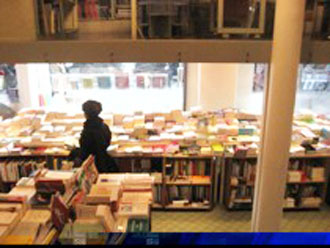
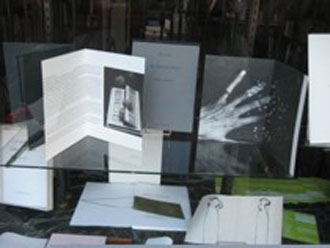
To learn more about the festival I visited the bookstores in St. Germain des Pres. Some linguistic confusion dysfunctioned my communication with the salesclerks of La Hune (The Peak), but I received a royal welcome from the manager of the Librairie Nicaise, a bookstore specializing in Artist's Books. Michel-Ange Seretti is a tall (for the love of God, don't say lanky!) Venetian with a decidedly Talmudic beard. His store carries many collaborative works between major poets and artists, dating back to the experiments of Mallarmé, Degas, Blaise Cendrars, Delanoy , Eluard, Picasso, and others.
Lire en Fete
Friday, October 19, 2007 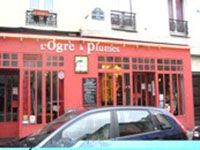
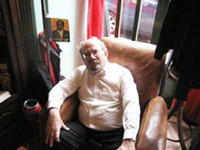
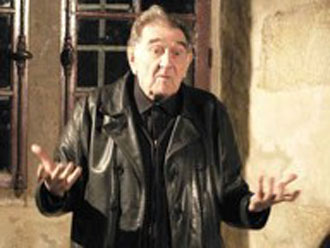
Disasters followed, on the first day, Friday October 19th of the Lire en Fete, thick and fast. For, it was, coincidentally, the second day of the first of a series of transportation strikes that plagued Paris throughout the 4 months I was there. On Thursday crowds in a somewhat jubilant mood, were everywhere. The great thing about French strikes in essential public services is that, because many people can't get to work, they become national holidays!
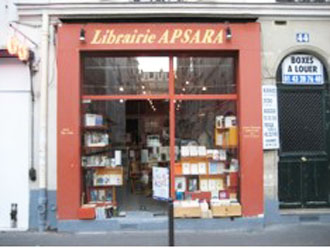
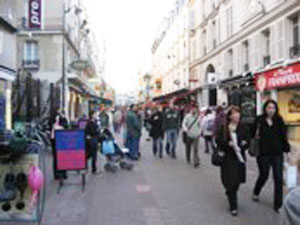
I left immediately after the showing of the film to give myself plenty of time to get to the Librairie Apsara in Montparnasse . By 5 PM the Metros of Paris had degenerated into a squalid nightmare: heavy entanglements of crowds, in the corridors and on the trains had created a turbulence of low Reynolds number and high viscosity. It took me over an hour and a half, from 5:30 to 7, to get from Station Parmentier to Station Denfert-Rochereau , a trip that normally takes half an hour. After putting in an appearance at the bookstore I had to leave after 20 minutes to get to the Comedie Francaise by 8 PM .
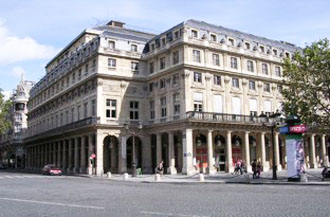
I may have bought the last ticket, but my seat was far from being the worst in the house. Imagine one of those boxes raised in tiers beside the stage, the kind of setting where the Marquise de Such-and-Such looks through her pince-nez up into the balconies to catch a glimpse of the latest mistress of the Duc de So-and-So! Furthermore there were many empty seats in the theater because of the strike. I had the box, with its 3 places, all to myself.
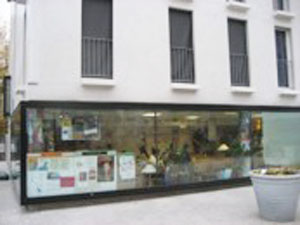
Cheap meals on week-days , community meetings ,poetry and theatre in the evenings, community center and coffee house during the day. Its manager is also the editor of La Page , a Socialist monthly sold on street corners and in bookstores around Montparnasse.
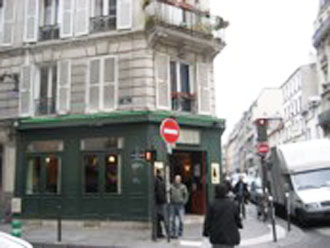
Lire en Fete Saturday, October 20
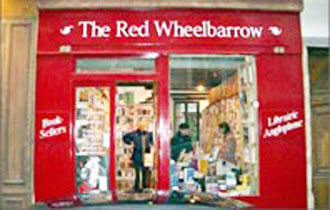
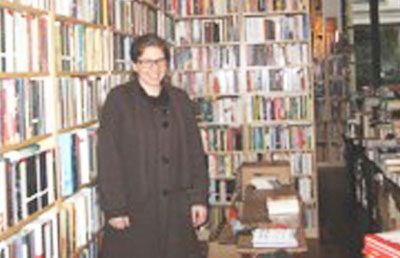
The Red Wheelbarrow bookstore is located on the rue St. Paul, along the southern edge of the ancient Parisian district known as the Marais. In the spirit of Sylvia Beach who created the original Shakespeare and Co., Penelope came to Paris from British Columbia 18 years ago with the express purpose of setting up an English language bookstore.
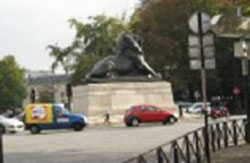
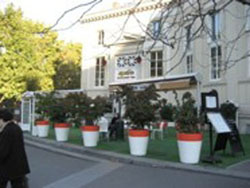
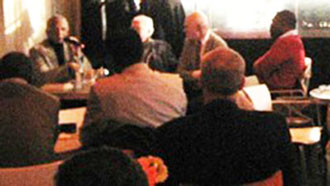
The next event on the list for Saturday's Lire en Fete was a reading/interview with a writer from the former French Congo, now Republic of the Congo. The address of the venue, the Apollo, a bar/restaurant, was simplicity manifest : 3 Place
Denfert-Rochereau. It would take me an hour to find it! The Place Denfert-Rochereau is distributed, more eccentrically than concentrically, around the lion statue. Even
integered buildings lie to the north, odd integers are distributed south, on four streets and their corners. Integer 3 stands alone, beside buses to Orly Airport stationed in the bus station.
My quest had me circling the Place Denfert-Rochereau 3 times, directing questions at a diverse crowd of informants: fund-raisers for the French Red Cross on the rue Daguerre, a restaurant, and a discount store for exotic camelot . (Not the Kennedy type. His administration was called Camelot because he came a lot. )
1969-1971: Minister of Education
1972-1973: Minister of Foreign Affairs
1973-1976: Prime Minister
1981-1998: Assistant director, then director of Unesco
Since 1998: Ambassador to France from the Republic of
the Congo.Tributes to Samuel Beckett
Bust of Samuel Beckett, unveiled at the Mairie of Montparnasse
Beckett lived in Montparnasse for 30 years. During the Lire en Fete a commemorative celebration was held in the wedding assembly hall on the second floor of the Montparnasse Town Hall (Mairie du
Quatorzième). Following tributes by friends, actors, and writers, 3 monologues were performed by noted actors . 3 more short plays were presented in a film. This bust was unveiled and its sculptor, a Russian woman, spoke about her friendship with Beckett. On November 11th, as part of a ceremony in which awards were given to school children for their writing projects, the bust was placed at the entrance to the wedding hall.
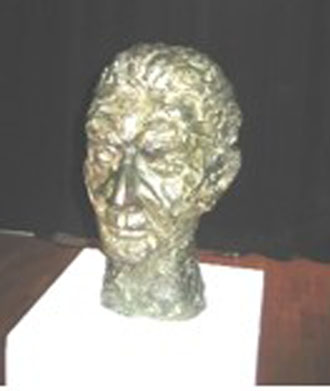
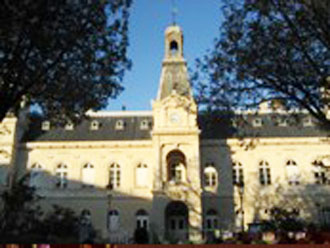
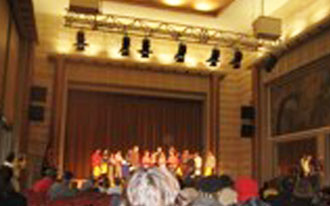
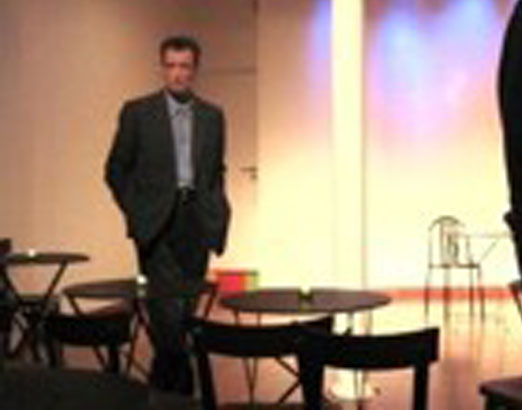
Lire En Fete Sunday, October 21
The one event I participated in on the last day of the Lire en Fete was not on the list I'd drawn up. Nor was it a literary events but a lucky accident
After taking lunch (on the rue de la Huchette) and a stroll (on the Boulevard St. Germain) I arrived at that miraculous neighborhood known the world over as St. Germain des Pres. Here, at the intersection of the Boulevard St. Germain and the rue Bonaparte one finds a large cobbled space,( a parvis) and one of the oldest churches in France. Deployed in full strength was an abundance of breeze, sunshine, tourists and natives. On the corner just outside the Metro entrance and to the right of the church a jazz band from Belgium was delivering superb renditions of paradigm Dixieland. They attracted a large audience and good tips. Sales of their CD weren't so good.
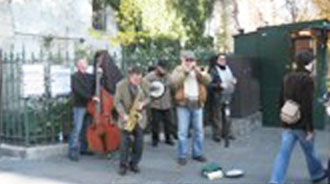
I'd gone there to join a Lire en Fete event, scheduled for 3 PM, sponsored by the bookstore, La Hune. Due to illness this event, a guided tour through the safe houses of the French Resistance, was cancelled. It had been rescheduled for a later date.
I therefore continued on to the next item on my list: a day- long Open House of a group calling itself the "Self-Published Writers of Montparnasse" at the Annex of the Montparnasse Mairie. The Mairie is located only a few blocks away from the rue Daguerre on the rue Boulard. Adjacent to it, on the rue Gassendi, (the atomic theory guy), one finds the Annex.
Two men were conversing in a neighboring park. One of them carried a violin case that, rifle-wise, dangled from his right shoulder by a leather strap. Tuxedoed, clean as a freshly opened bar of soap, slicked down hair and meticulously shaven, from which I concluded that he was either coming from, or going to, a concert. The other was far more insouciant in appearance, garb and manner, from which I correctly concluded that he might be a composer of some sort.
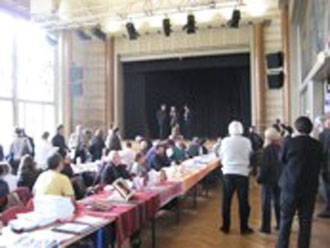
By way of consolation Girard invited me to their concert, scheduled (precipitously) at 4 PM in the Montparnasse Conservatory, itself located (fortuitously!) inside the Mairie Annex.
I accepted. I would discover that I'd done the right thing.
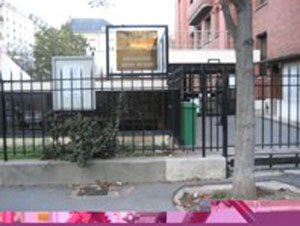
The program included works by 3 contemporary French composers, all teachers at the Conservatory, and one by Maurice Ravel: Introduction and Allegro for flute, clarinet, harp and string quartet. The same instrumentation, in suitable subsets , and with the occasional addition of a piano, was used in all of the pieces on the program.
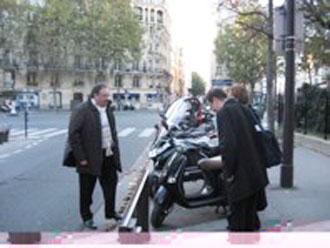
Composers Lysight and Marchand (concealed) 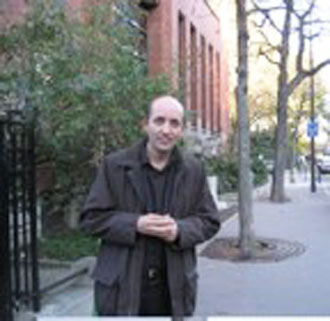
After taking his picture I thanked Mr. Girard for inviting me to the concert. Then I added: " I liked the way you used that theme from the E-flat Prelude of J.S. Bach! "
Trials and Tribulations
Paris is a great city, perhaps the greatest of the modern world, possibly the greatest in history, in the class, certainly, of Babylon, ancient Rome and Alexandria. It has taken a thousand years to reach that pinnacle of greatness, which is why so few things, machines, systems, people, function properly, and why one can usually expect things to breaks down. The first indication that there might be more to this visit to France than a series of festivals, conferences, visits to museums, readings and lectures, occurred on the morning of October 7th. That's when the door on the right side of the medicine cabinet in my bathroom flew off its hinges and shattered the surface of the sink.

In no way could I, however embarrassing the circumstances, be held liable for damages; it was simply an accident waiting to happen. However it was not to be imagined that my landlady, Marta Spranzi, would see it that way. Admittedly it wasn't her fault either, for how was she to know that something no more substantial than a muscular spasm would send a strange little 'doornik' flying off into space and bring about the destruction of an entire sink! Initially she wanted me to pay for repairs (about $500).
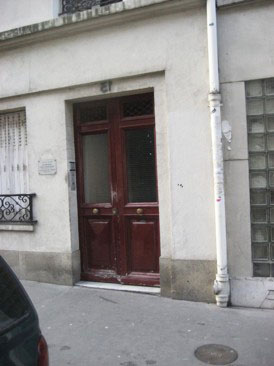
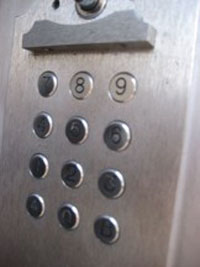
The plumbers did not return to finish the job for another two weeks. In the interim a host of new problems emerged which put the dilemma of the stricken sink in the shade. Further complications were introduced by the week-long public transportation strike. These were mere trivia in comparison with an imminent disaster soon to descend upon us. My apartment was on the second floor ( the first "stage" in French) of a four story building. The pair of doors at the entrance had to be opened by poking a numerical code on an electronic keyboard in the door-frame. The gadget's circuits died on the day after the first visit of the plumbers.
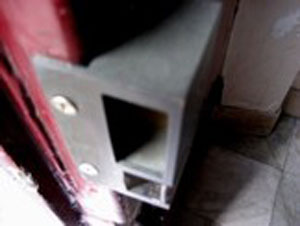
"Life in Paris is like Hamlet!" he swore, "You soon become overwhelmed! " Although the bolt and its casing were solidly fixed in the door, he was able to twirl two long ancient screws from the case; now it jiggled when shook. Dan closed the door panels and asked me to try to push them open. They opened inwards easily and we assumed that the problem had been fixed. He pocketed the screws, hopped onto his bike and raced off to the Gare d'Austerlitz.
Second visit to England
November 22-30
London-Chichester-Southampton-Exeter- Portsmouth-London
Strikes in the first two turbulent weeks of November brought chaos to Paris and paralysis to the rest of France. Following indications in the press that the strikes in the transportation sector would be extended throughout the rest of the month and include solidarity strikes by civil servants, lawyers, judges, students, and many other aggrieved persons, parties and professions, I decided that it was time for a return visit to England. Half of the lectures at the Poincaré Institute were being cancelled, so I wasn't afraid of missing anything.
The only trains running on a normal schedule were those of Eurostar. A recently inaugurated Eurostar terminus at St. Pancras Station reduced the travel time from Paris to London to two hours and fifteen minutes in real time, and only an hour and fifteen minutes by the clock ! ( Although the Greenwich Meridian runs right by Paris, the bitter priority fights of the 18th century between England and France inspired the French to set their clocks one hour later than those of England.) Leaving Paris at 10:15 AM one arrives in London at 11:30.
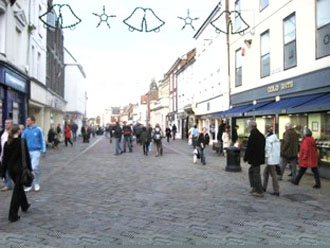
At St Pancras Station I stepped out into the phenomenon of a world-class metropolis assailed by torrential rains. Increasing in intensity throughout the train ride from Victoria Station to Chichester, they did not relent until 2 AM the following morning. For the rest of that day I would be outdoors, walking around under a downpour asking people for directions. From the train station in Chichester I walked through streets darkened by heavy clouds, my head exposed to the pelting rains, looking for the Tourist Information Centre. It's 4 blocks from the train station, and normally staffed, as I discovered on an earlier trip to Scotland , by amazingly helpful people. A woman named Nora devoted half an hour to making telephone calls to find me a bed and breakfast at 30 pounds. We were both astonished when she succeeded.
Landlord: Mrs. Ruth Pitts
Address: Kia-Ora Main Road Nutbourne
Chichester West Sussex
PO18 8RT England
Telephone: 01243 572858
Email: kiaorabandb@aol.com
Before turning in for the night I read a few pieces from a volume of the complete stories of D.H. Lawrence, purchased at an Oxfam in Chichester for the perfunctory price of 5 pounds. I found it a strange experience, having to come to terms with some of the strongest prose, sentence-by-sentence, ever composed by anyone lucky enough to enter the canon of English literature, surging forth from a mind with virtually nothing one can call an intellect, and the emotional maturity of a 12-year old. I kept the book with me for as long as I could, but the practical necessity of getting rid of excess weight prevailed, and it was left in the youth hostel in Portsmouth on my journey back to London the following week.
Southampton
Some people need to find excuses for visiting unfamiliar places, when in fact all that they really want to do is just travel about with little or no purpose in mind. It was in this optic that I managed to convince myself that it would be worth the world's time to interview Ray Monk at the University of Southampton. He's well know to people interested in such things, as the author of a two volume biography of Bertrand Russell, ( reviewed in Ferment Magazine. Go to
Ray Monk )
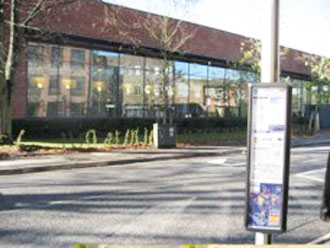
U Southampton
Despite international fame ( and one can presume, info to the contrary, that Ray Monk is the most famous personage at Southampton U.) , his office is not in the main building, Highfield Campus, but a kilometer or so away, in the much smaller Avenue Campus. Thereby Southampton U. is entirely in tune with the most advanced tendencies in the modern world which, since Justinian closed down the schools of Greek philosophy in the 11th century A.S. (After Socrates) , have scrunched some rump relic called a 'philosophy faculty' on the top floor of the most pointless building on campus.

This picture of a log from the Southampton grounds reflects my sense of communion with nature after the failed search for the eminent Dr. Monk.
Exeter
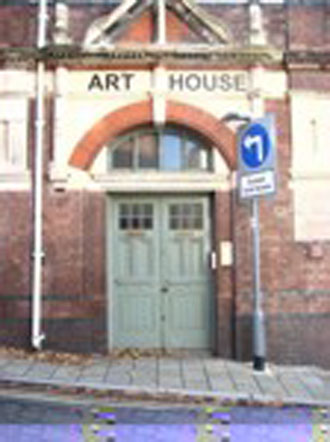
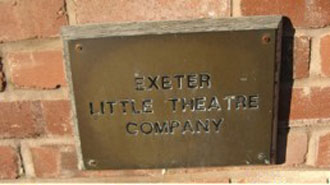
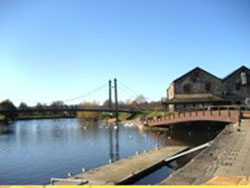
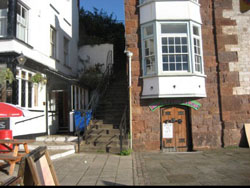
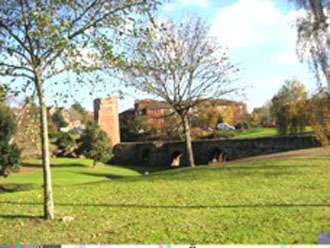
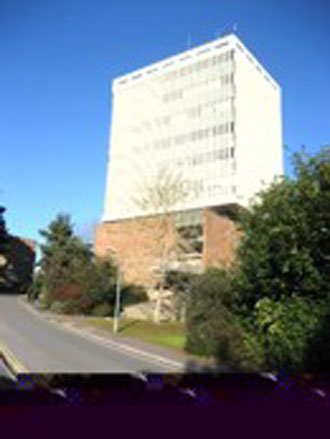
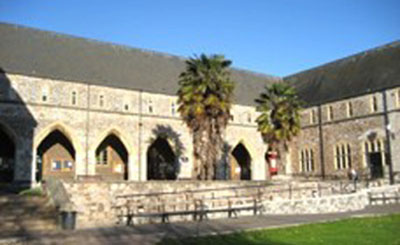
To 'justify' a visit to Exeter I went in search of Paul Ernest. professor of math education. His office was not in the math/physics building, but on the St Luke's campus, at the other end of town, in the education department. By an amazing coincidence, Paul Ernest was also in Norway! Perhaps even at the same conference as Ray Monk! I was content for his having provided me with an excuse for visiting Exeter. I found it to be a truly a delightful town, one in which I could have lingered a month or more.
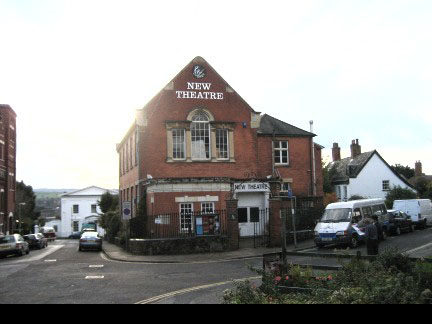
London November 28 2007
Celebrations of the 250th anniversary of the
birth of William Blake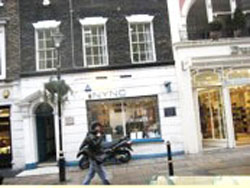
Near Oxford Circus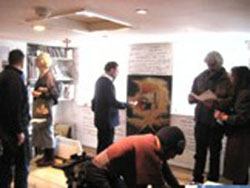
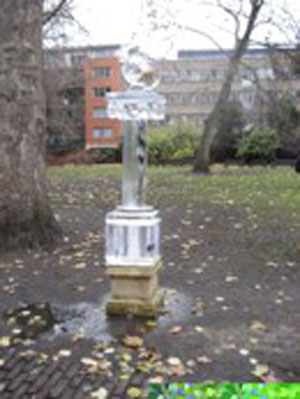
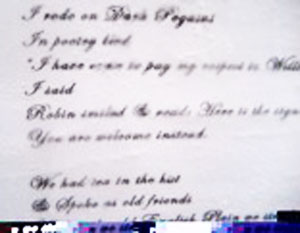
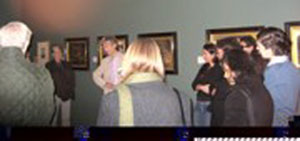
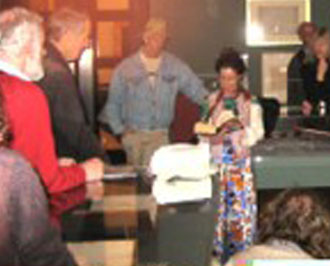
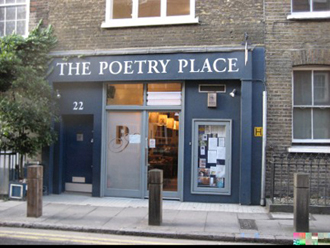
Has London found a place for poetry
or is poetry being "put in its place"?
Posters on the walls announce literary events around the city.
In a lounge in the basement readings are held almost every night.
The Royal Academy of Dramatic Arts, (RADA) is across from the University of London and around the corner from Waterstone's bookstore. It runs a café on the ground floor, with low prices, decent pastries and coffee, and the electric hum of a world center for thespian greatness! Anyone who sits there with a script every day for 20 years can feel confident that someone is bound to buy him a cup of coffee. It was a treat, all the same, to take my coffee breaks in a coffee shop surrounded by actors, students and teachers, under the mixed regard of disdain and awe as I worked away my journals.
Final weeks in Paris
December 1, 2007-January 8,2008
Photo Gallery: Homelessness in Paris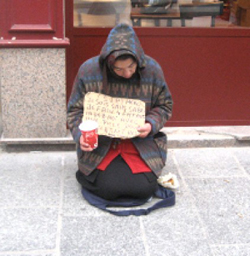
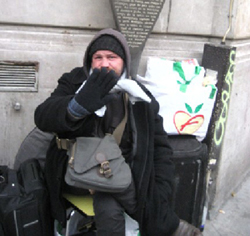
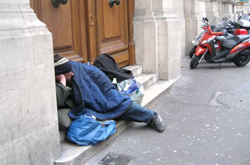
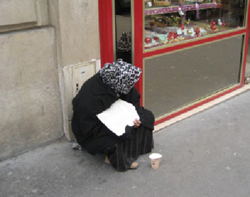
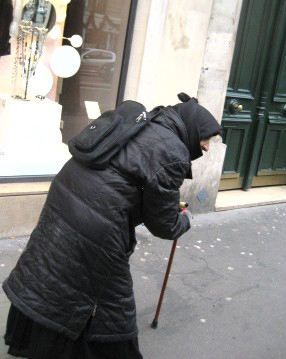
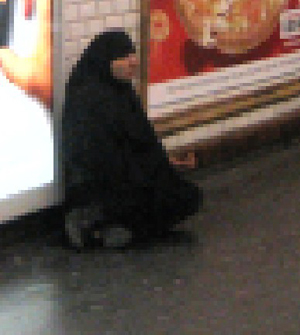
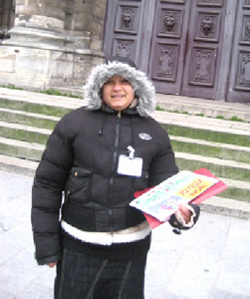
To dramatize the plight of the homeless, the organization "The Friends of Don Quixote" (Amis de Don Quichotte) set out a dozen tents along the Quai St. Martin. Homeless demonstrators stayed in them overnight. The CRS, the roughneck riot police, arrived the following morning. Painful images from the eviction of the tent city were shown on television. One person fell into the river and was pulled out.
Louis XIV's Paris Observatory

Salle Cassini
December 15,2007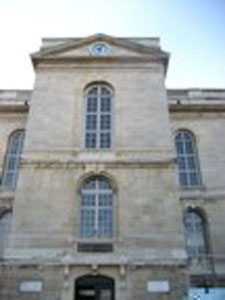
Boulevards Arago and Denfert-Rochereau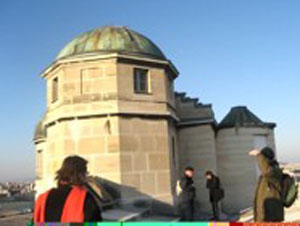
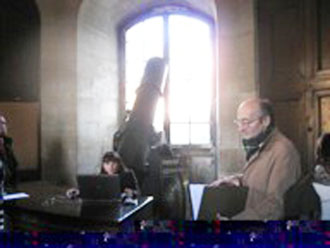
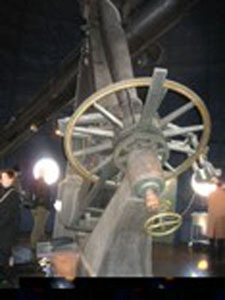

The telescope was much heavier than estimated, and an intricate support structure, the "spider" had to be built beneath it. The cost overrun was 1000% . Though some people maintain that Eiffel built it, he was only 9 years old at the time. He may have been among the inspectors who visited it in 1845.
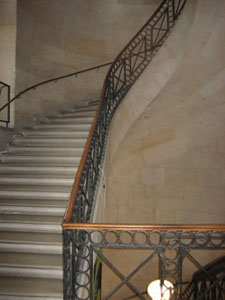
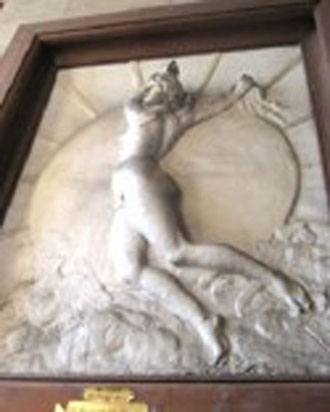
In the final two weeks of my stay in Paris I was given several opportunities to contribute something of my own to its cultural cosmos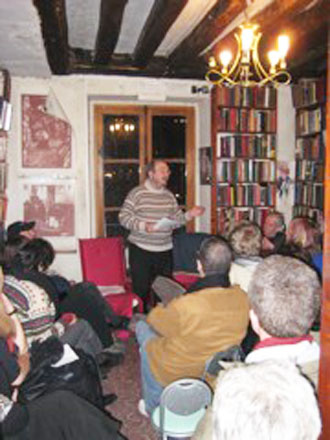
Christmas Eve, December 24, 2007Reading from my Christmas classic "Sam the Messiah Man".
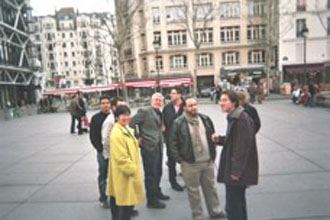
On the afternoon of January 4th , 2008 I delivered a talk "Zermelo-Fraenkel Axioms and Musical Form" at IRCAM, the music research institute adjoining the Centre Pompidou.
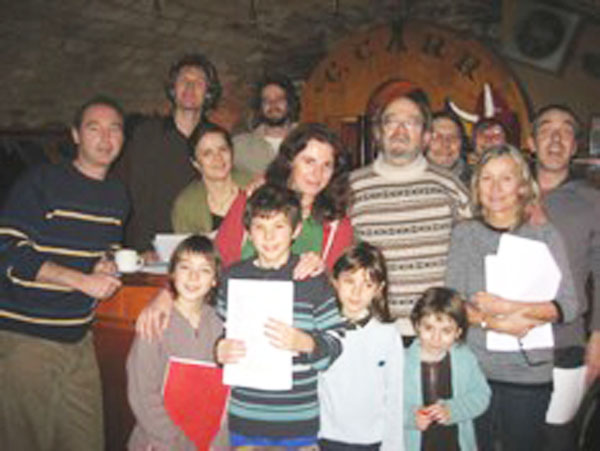
Carr's is an Irish pub located in the ritzy part of Paris just opposite the Tuileries and close by the Palais Royale. This is the district in which American tourists pay fabulous prices for rooms and services no better than what one can get elsewhere in Paris at a fraction of the cost. Read Orwell's "Down and out in Paris and London".
Play-readings by professional English-speaking actors are organized here every other Sunday, by actress Stephanie Campion, and her organization,Moving Parts. My children's play, "Kangaroo Songline" was produced here on the night of January 6, 2008.
Return to
Home Page
